Erwin Alton Allen 1904 - 1980
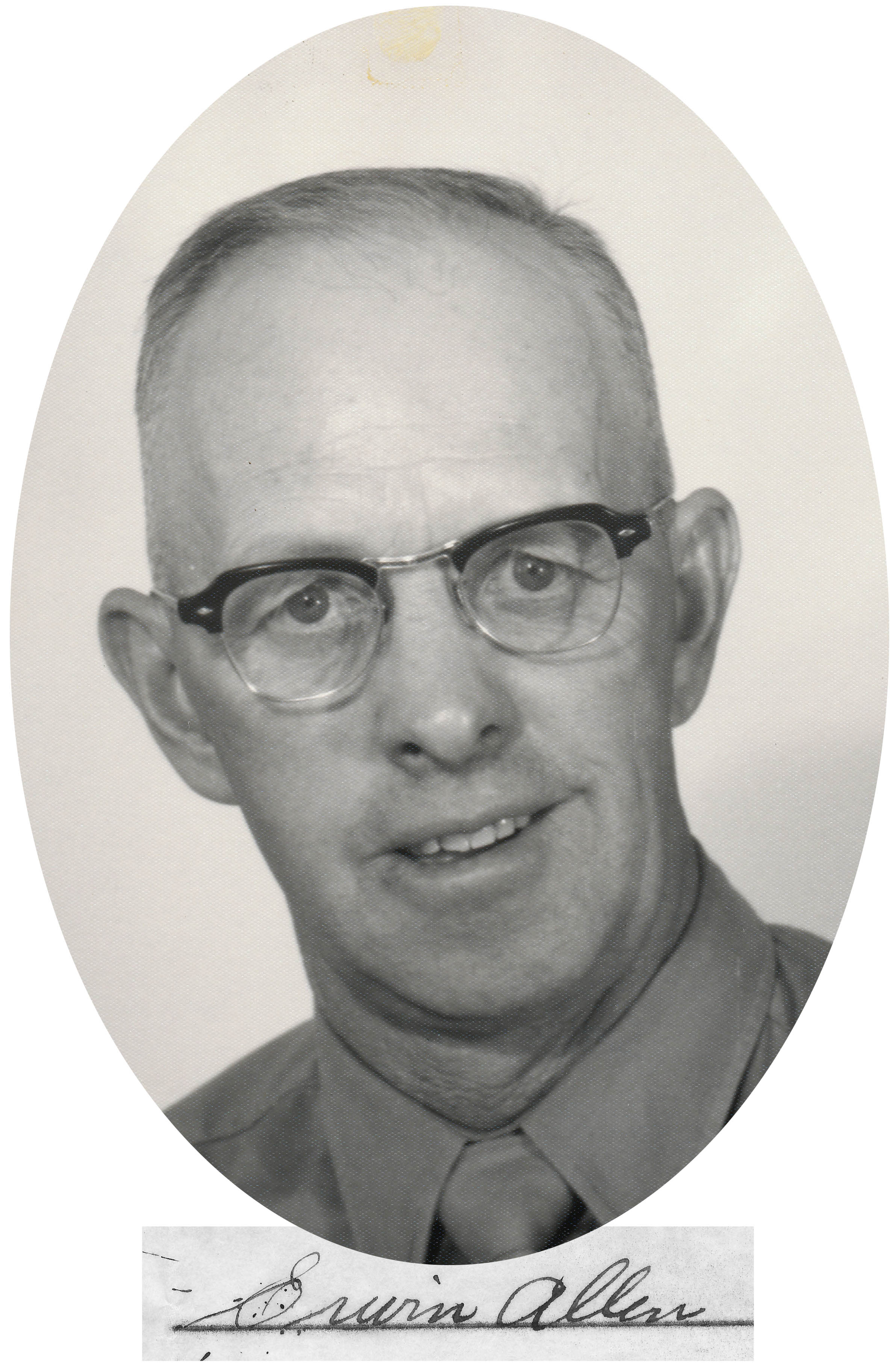
Links for Erwin Allen
Erwin Allen History
Erwin was born December 18, 1904 in Paradise, Utah. He was the 5th of seven children born to John Ethan Allen and Margrethe Christine Teslie. He was blessed in the LDS Church 5 March 1905 by Samuel Holbrook (source: Allen Family LDS Family and Individual Record Book., pg 31).
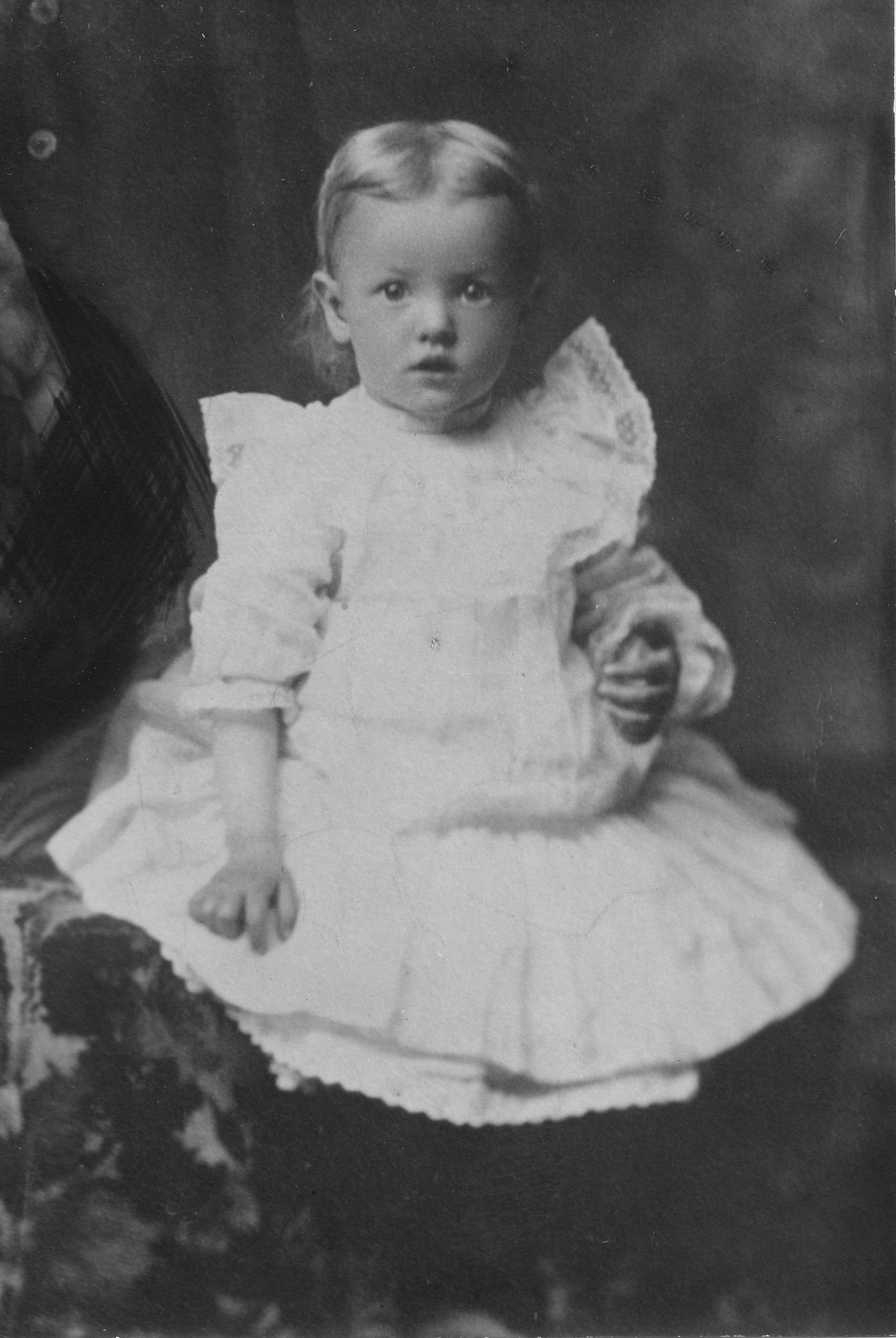
Erwin Allen, probably 1906, (1.5 - 2 years old)
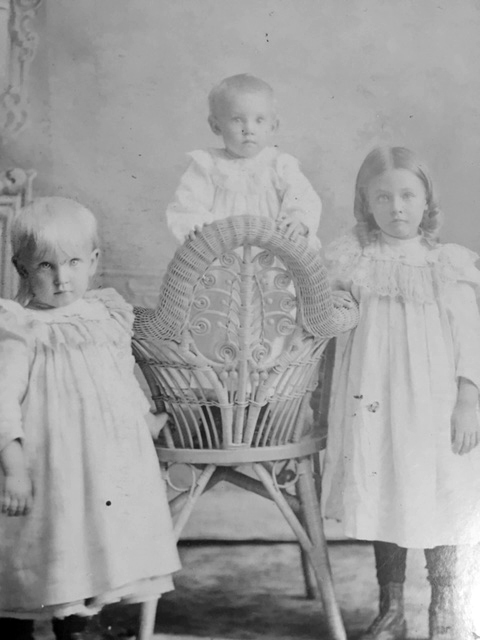
Erwin Allen (on left), 1908, (~3.5 years old)
Clyde in middle and Selma on Right
Up until his 6th birthday Erwin lived in Paradise.

Erwin (listed as "Alton") in the 1910 Census (
Entire page
)
In 1911, Erwin's parents moved to a 40 acre farm in Wapello, Idaho, which is 7 miles north of Blackfoot. They later purchased the farm in 1913. There was a house on the place made from hewn timbers. It was two stories with two rooms upstairs.
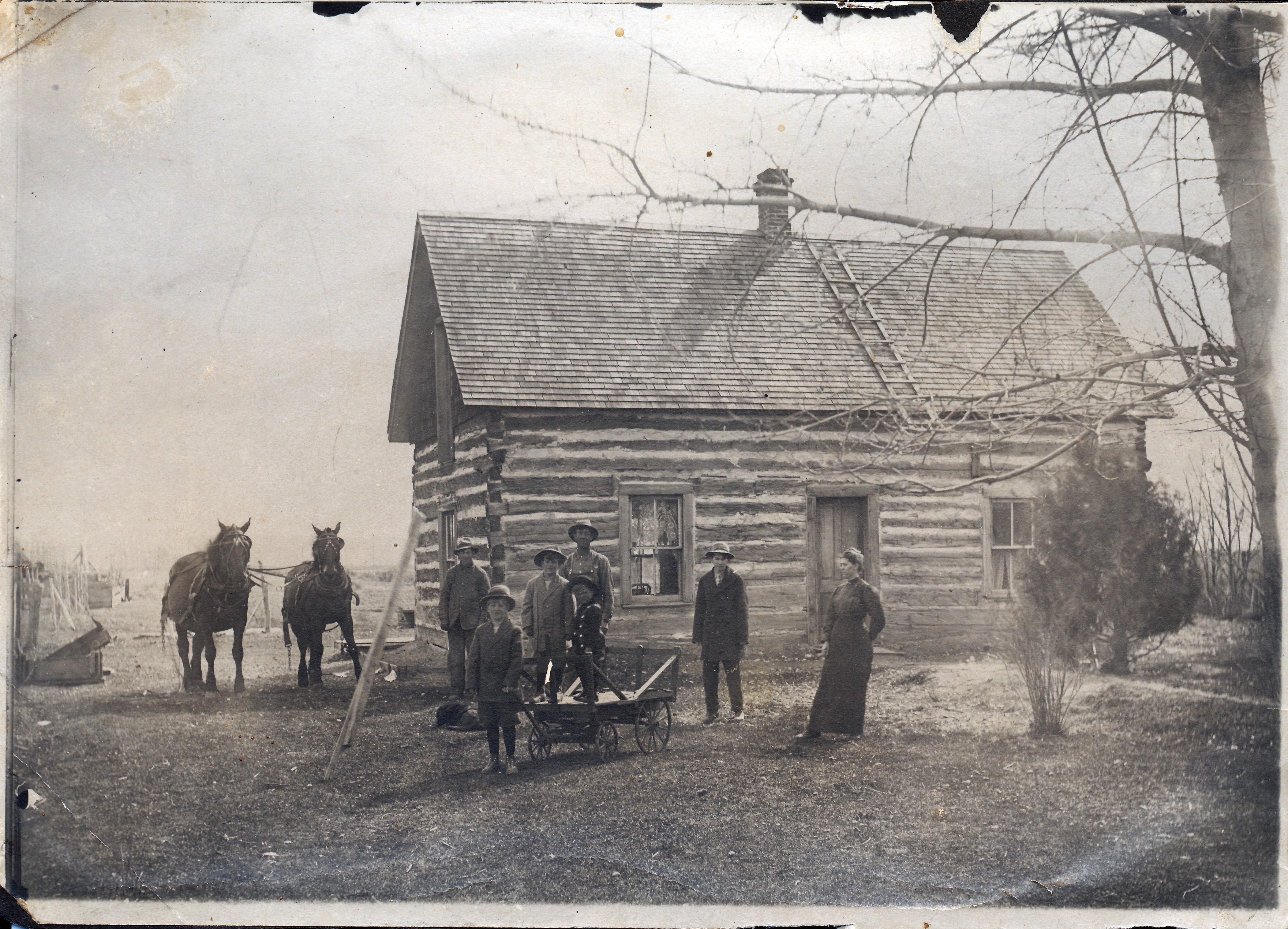
The family in front of the original house probably early spring 1911
Margrethe on the far right, Ethan Sr. in the middle in the back
The boys from left to right: Ethan Jr., , Erwin (in front of the wagon), Alfred, Clyde (in the wagon) and Dolph. Donald asleep in the house.
The old house sat where the garage on the current day house is.
He commenced schooling in September 1912 at the Kimball, Idaho school (source: Allen Family LDS Family and Individual Record Book., pg 31).
Erwin was baptized into the LDS Church 28 October, 1913 by George Dane and confirmed by Thomas Morgan the same day. He received the Aaronic Priesthood and was ordained a deacon 18 December 1916 by E.V. Call, and a teacher on 5 January 1920 by Amos T Tucker (source: Allen Family LDS Family and Individual Record Book., pg 31).
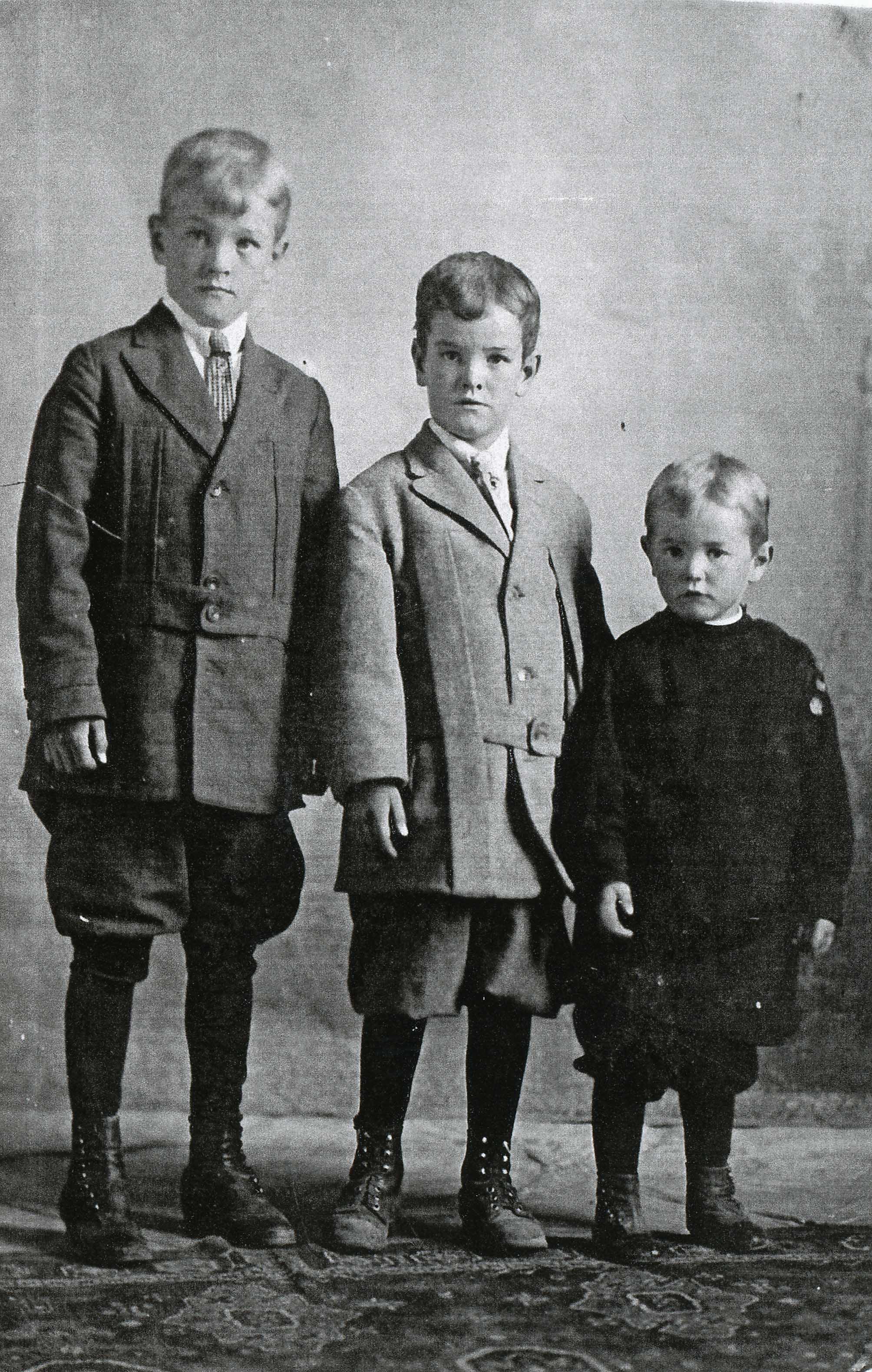
(L-R) Erwin (age ~10), Clyde and Donald Allen (about 1914)
Erwin graduated from the Wapello school 9 April 1920.

Erwin 1920 Census (
Entire page
)
A Following is a short anecdote shared with me by Gene Hancock, who's dad was a good friend of Erwin: "I remember my Dad telling us about your grandpa Allen. It took place when your grandpa Allen was in school. The teacher asked a question to the class (they must have been learning about American history), if they knew who Ethan Allen was and your grandpa raised his hand and said, 'he’s my dad'."
Erwin was known by the nickname "Win" to his friends as an adult. It is believed by his son Dean that the nickname was also his when he was younger.
"The summer he was sixteen (1921) Erwin cultivated a beet seed patch. All summer long he would get up ride his pony six and one half miles to work . Get his team of horses. Harness then and hitch them up by 6:45 am. Cultivate until noon. Rest the horses for an hour. During that hour he had fed and water the horses etc. also eat his lunch which was two jam sandwiches. Then cultivate from one until six pm. Unhitch and unharness the horses, feed and water them and then get his own pony and ride 6 1/2 miles back home. Upon arriving home he would do his chores, eat, usually bread and milk because dinner had been served earlier and his mother did not allow any cooking after the meal...another fire in the cookstove made the house too hot. Off to bed and get up do his chores, get on the horse and go again. He worked there all summer. He told us he was sure glad when that summer was over and that for the rest of his life “He had never been so tired as the summer he was 16. (Source: Darlene Allen's personal history (pg 11)
The next summer (1922) he worked at a quarry making huge granite blocks used in the Shelley tabernacle." (Source: Darlene Allen's personal history (pg 11)
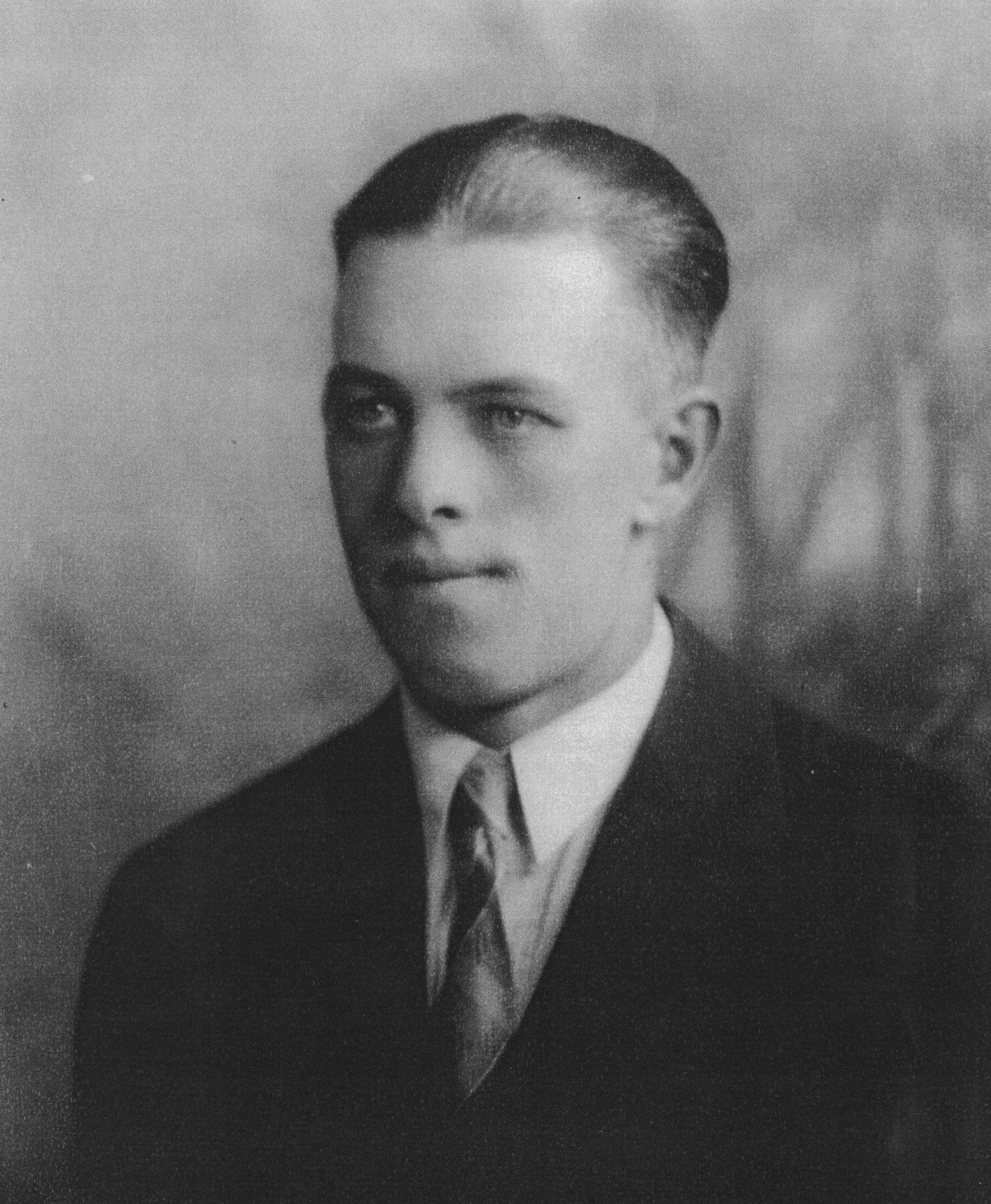
Erwin Allen around 20 years old
In the mid to late 1920's when Erwin was in his 20's, he left home with his brother Clyde and several other young men from around the Wapello area and traveled in the neighboring states Wyoming, Montana, Oregon) for work. This was for several years. Clyde met his future wife Madge in Montana and stayed there. When Erwin got word his dad was sick he came home. He was the only one of the young men who left who came home. Listen to the audio (recorded June 2015) as Dean (Erwin's second son) describes these events.
Sometime in the 1920's, Dean believes it was after Erwin came home from his travels, Ethan, Erwin and Donny went to work for the railroad doing the grade for the tracks from Idaho into Montana. They had their own team of horses. Listen to the audio as Dean describes them working for the railroad and how Erwin became a "blacksmith". Dean refers to them using a "slip bottom scraper". It is otherwise called a "slip scraper" or "drag scraper". You can see a description of a slip scraper at this link. Here is a video of a animal drawn slip scraper in action.

Erwin 1930 Census (
Entire page
)
Note that in this 1930 census Erwin is listed as a head of household and a separate farm number. Sometime before the census in April 1930, he had rented or leased a farm, that was just up the road from his father's farm. There was no house on this farm at this time so I believe it likely he lived at his parents home until his marriage.
In the Allen Family LDS Family and Individual Record Book., pg 31, Erwin is listed as being 5'10.5" tall and weighing 165 lbs. His hair was light brown and his eyes blue.
In 1930, Erwin met his future wife Idona Isolene Tolman, at a dance at the beet warehouse shown in the picture below. The warehouse sits just across the railroad tracks at Wapello. Listen to this audio as Dean and Verlene Allen describe how Isolene and Erwin met.
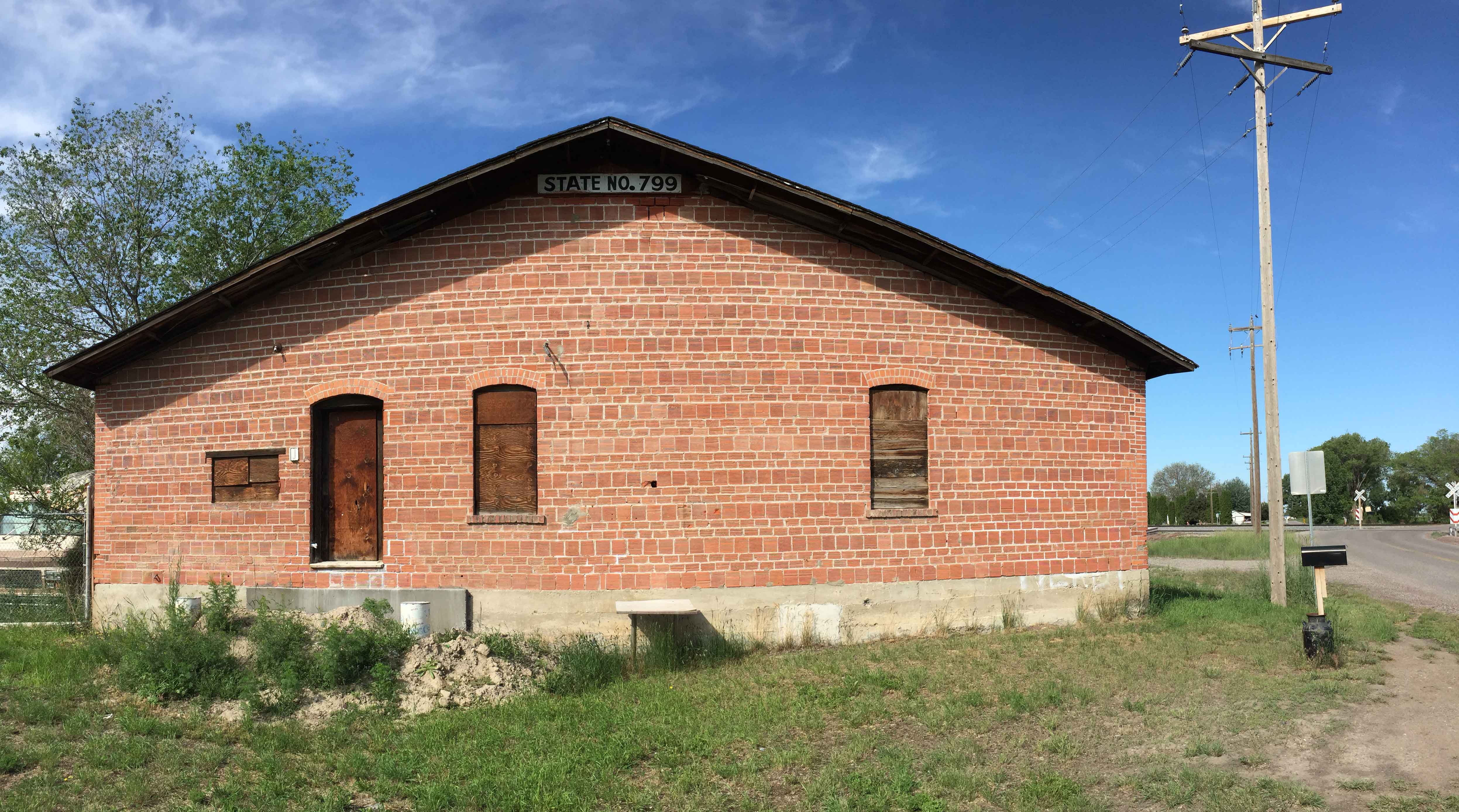
Beet warehouse where Isolene and Erwin met at a dance
From the History of Lavaughn (Tolman) Fowler (Isolene's sister), pages 26-27:
She (Isolene) met a fine young man and they went to American Falls, Idaho and were married on "Friday the 13th" of February 1931. Erwin always said, "our lucky Friday the 13th, 1931".
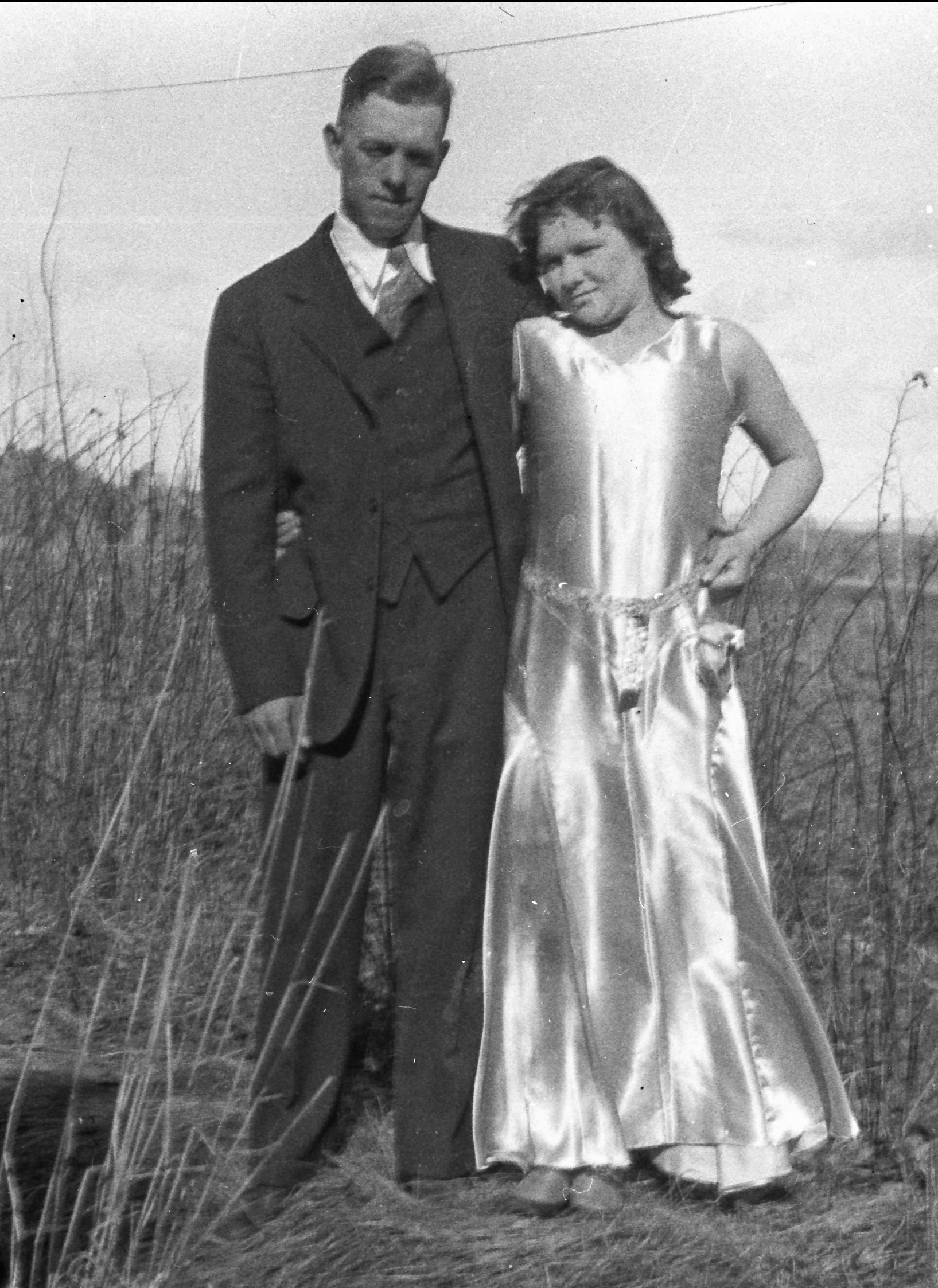
Erwin Allen and Isolene Tolman Wedding picture
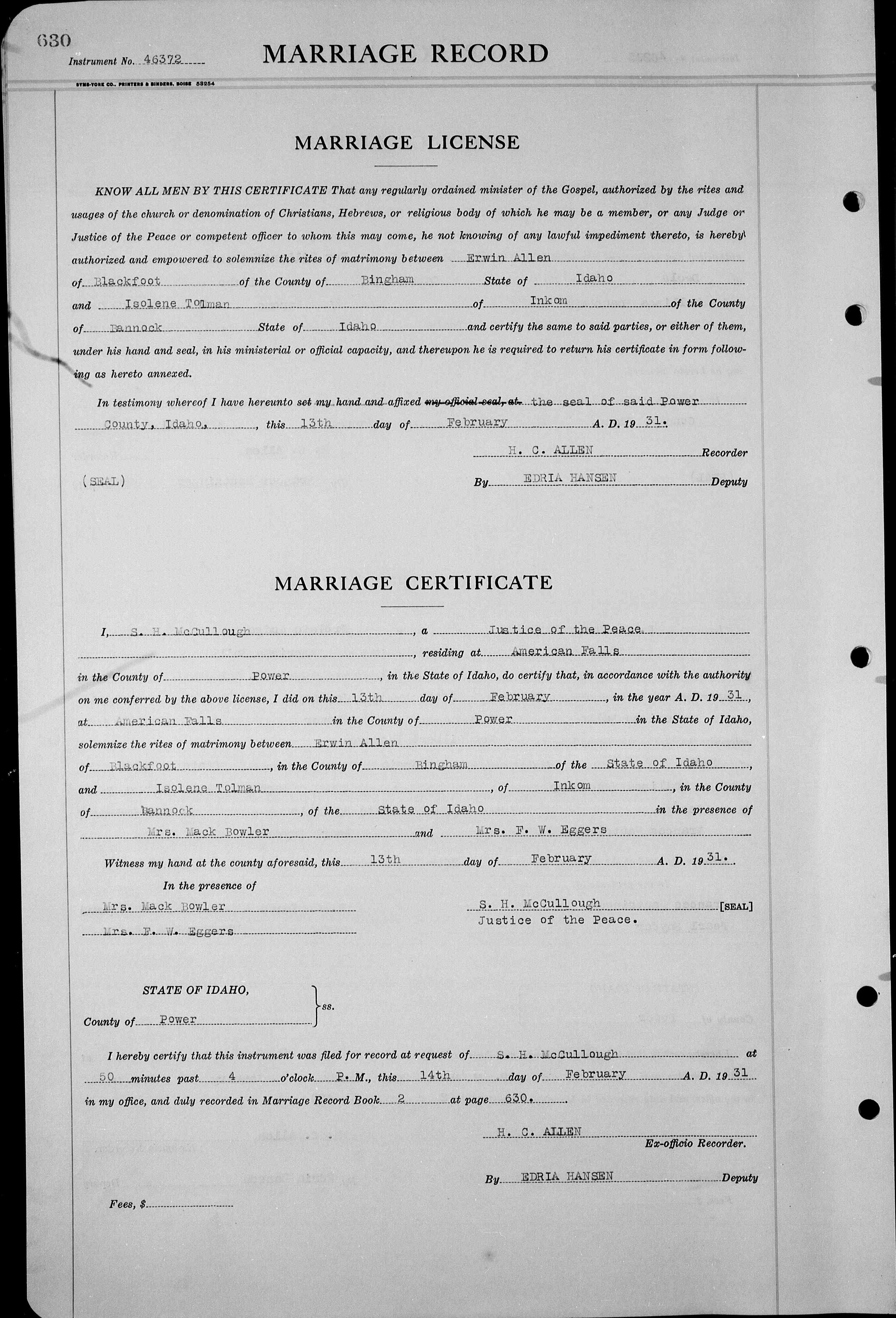
Erwin Allen and Isolene Tolman Wedding Record
The couple were married by S. H. McCullough (source: Allen Family LDS Family and Individual Record Book., pg 31).
Isolene related to her daughter-in-law Verlene Allen, that at the hotel in American Falls where they were spending their honeymoon, there was an outbreak of measles and Erwin and Isolene ended up quarantined at the hotel for a week.
The only building on Erwin's farm was a chicken Coop. The newlyweds turned the chicken coop into their home by cleaning and then bleaching the walls and floors to remove odors and stains. They then covered the walls and floor with white butcher paper. Listen to this audio of Dean and Verlene talk about Erwin and Isolene's first house.
Erwin's father became quite ill in the fall of 1931 and then died in February 1932. During his father's illness Erwin helped take care of his father's farm as well as working his own farm. After his father's death Erwin continued to help work his mother's farm.
Isolene and Erwin first son Erwin L Allen was born in November 1931 at their farm house. It is unlikely that a new house had been built so this was in the converted chicken coop. It was a very hard pregnancy as "little Win" was breach. Attending the birth was Erwin's mother Margrethe and Isolene's mother Mary Ellen Tolman. After many hours of labor (reportedly about 40), Erwin went to town and fetched the doctor who turned the child and allowed him to be born.
Erwin received the Melchizedek Priesthood and was ordained an Elder on 8 January 1933. He was endowed at the Logan Temple, 24 October 1934 (source: Allen Family LDS Family and Individual Record Book., pg 31).
Isolene and Erwin were sealed in the Idaho Falls Temple October 24, 1934.
A second son, Louis Dean, was born in December 1934.
In November 1935 Donny, the youngest of Margrethe's son married leaving Erwin's mother Margrethe alone on her farm. It is likely at this time that Erwin was operating both his own acreage and the family farm. On March 1, 1937, Erwin purchased the farm from his mother, for the sum of $4,000. Erwin and Isolene would live at this farm for the rest of their lives. The agreement was for Erwin to pay Margrethe $400 at the time of the sale, $200 on December 1, 1937. Erwin was then to pay off the mortgage of $2,072.72 first and then pay to Margrethe the balance of $1,927.28. As part of the sale a plot of 1/20th of an acre (33'x66') remained the personal property of Margrethe for "as long as she may live". A small house was built on Margrethe's personal property where she lived the rest of her life. Erwin's brothers Clyde and Donny were witnesses to the sale. The Farm Sale Agreement.
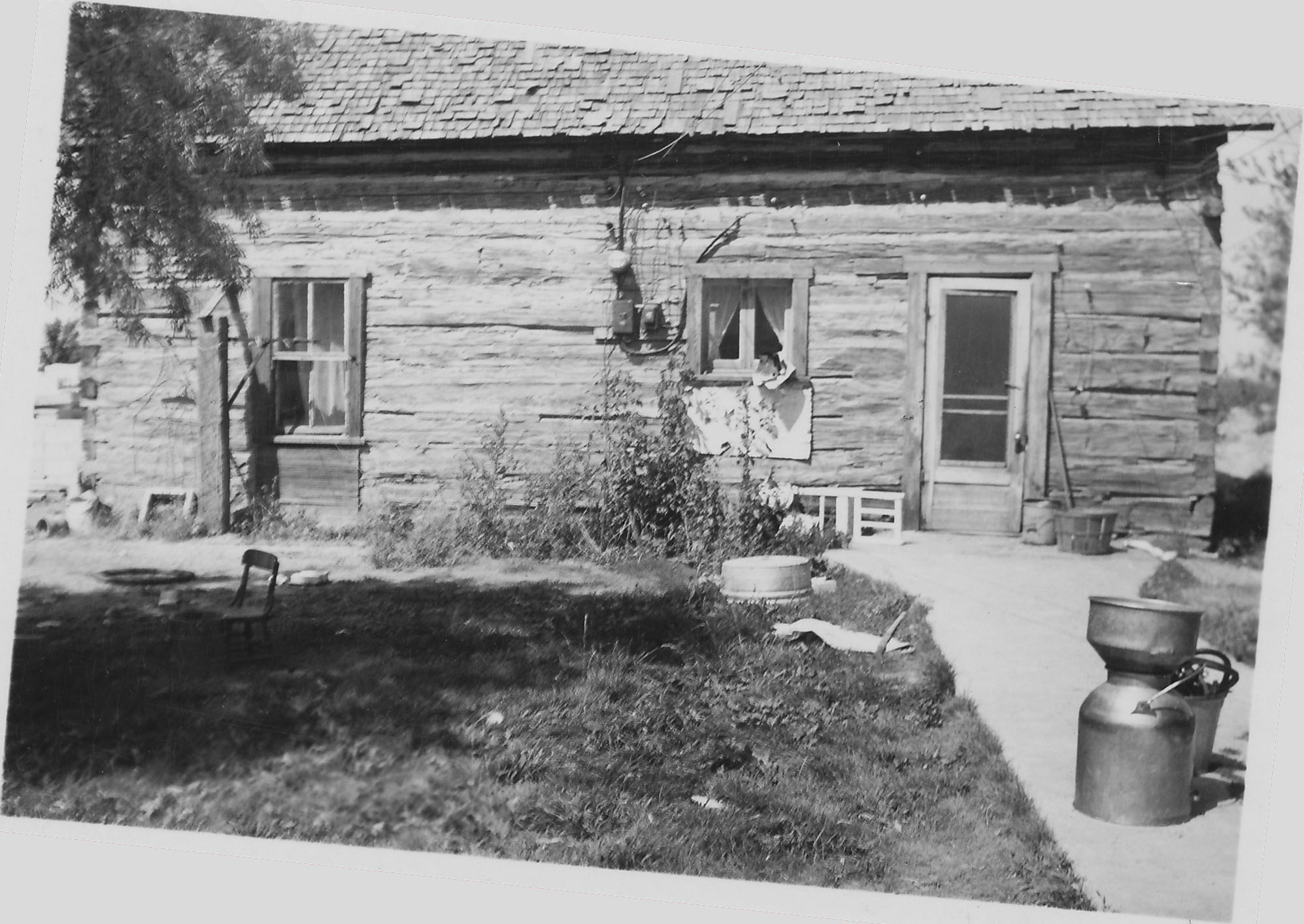
Erwin and Isolene's house after purchase of farm from 1937 to 1949
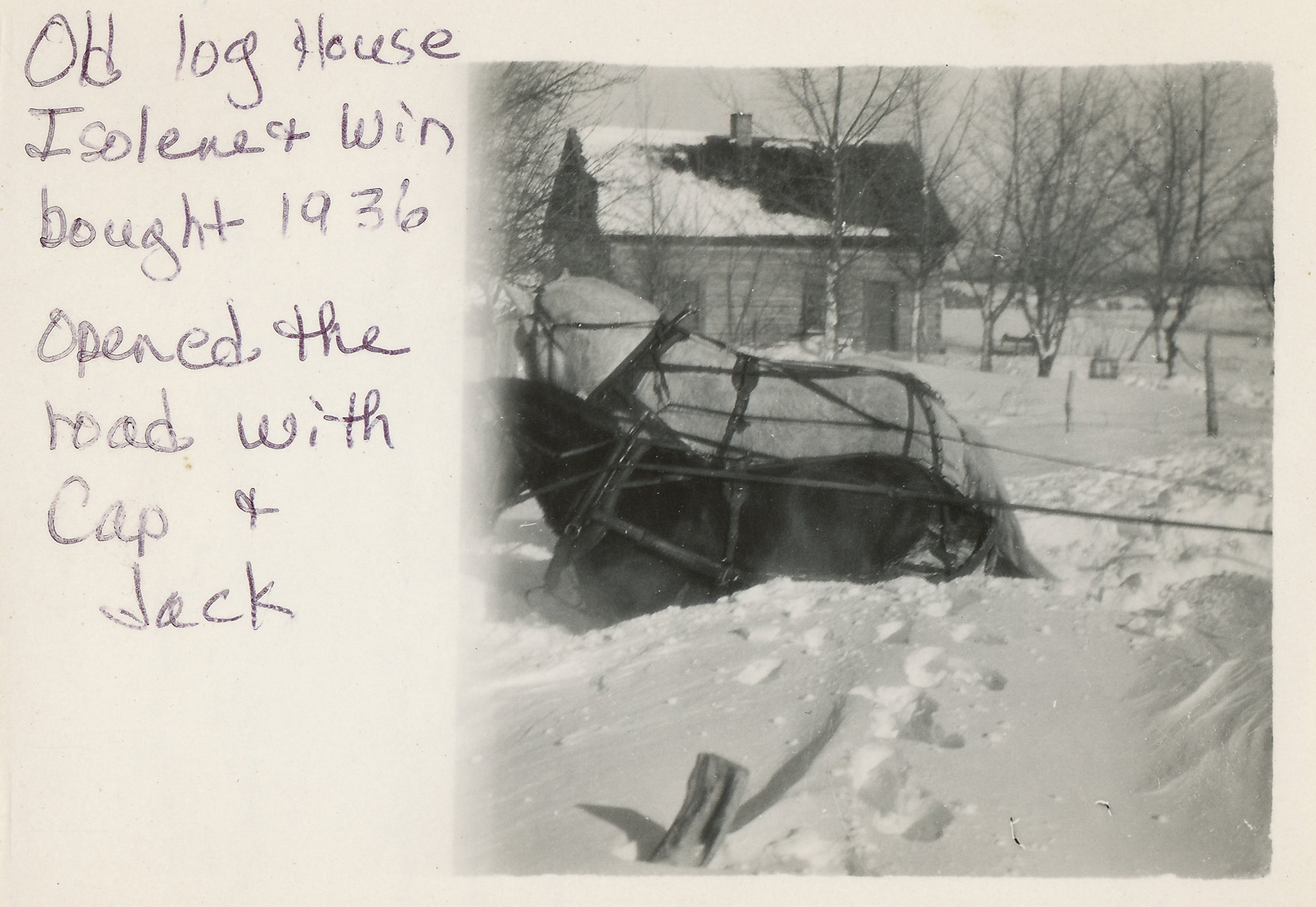
House. Horses Cap and Jack used to clear the road
In the 1977 journal is a note by Erwin which indicates that the irrigation water for the farm is from a decree July 10, 1889 from the Blackfoot Irrigation company

Statement about water decree by Erwin
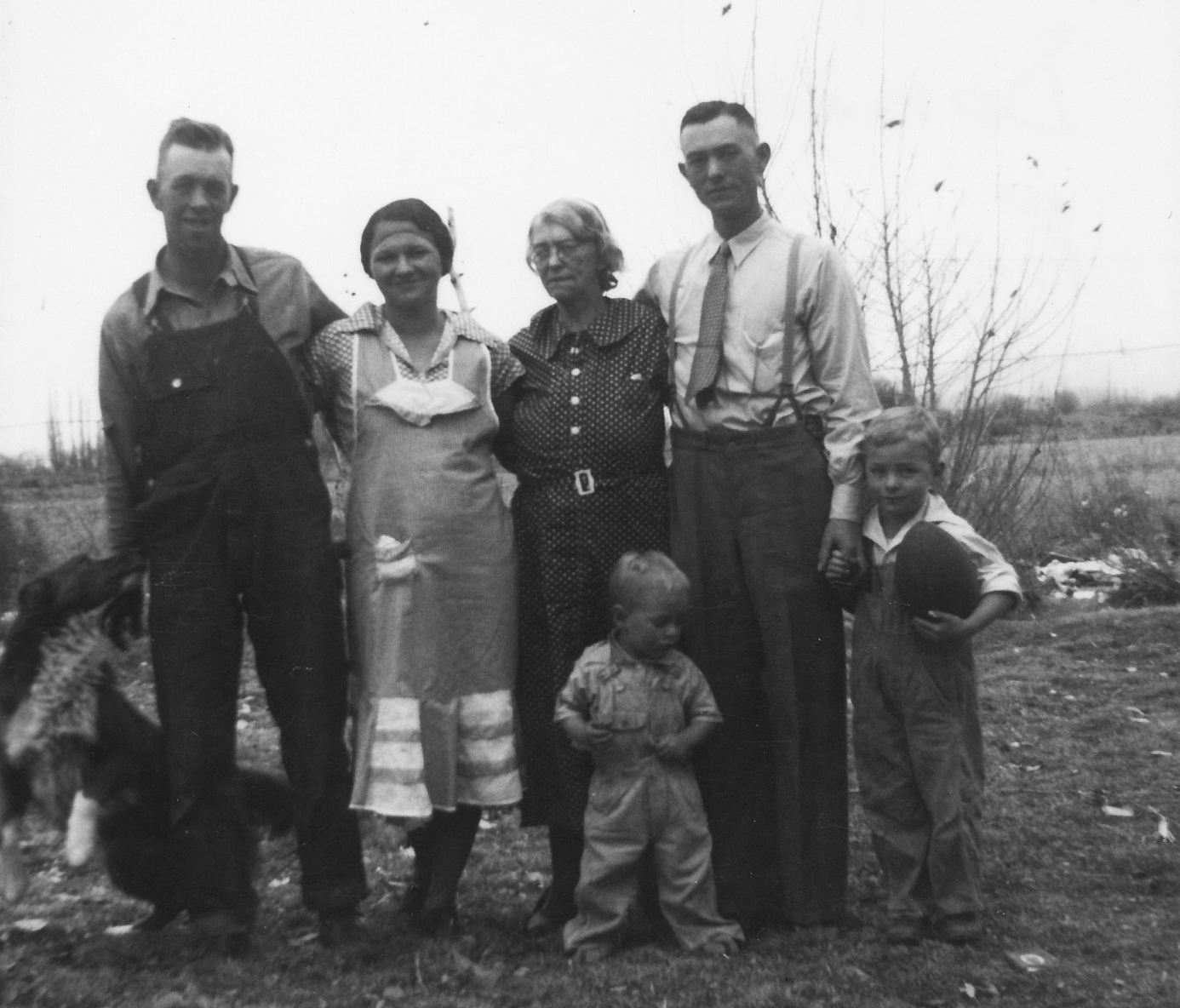
L-R "Chief" the dog, Erwin (age ~33), Isolene, Margrethe, Donald (brother)
Front L-R Sons Dean and Erwin
Fall 1937
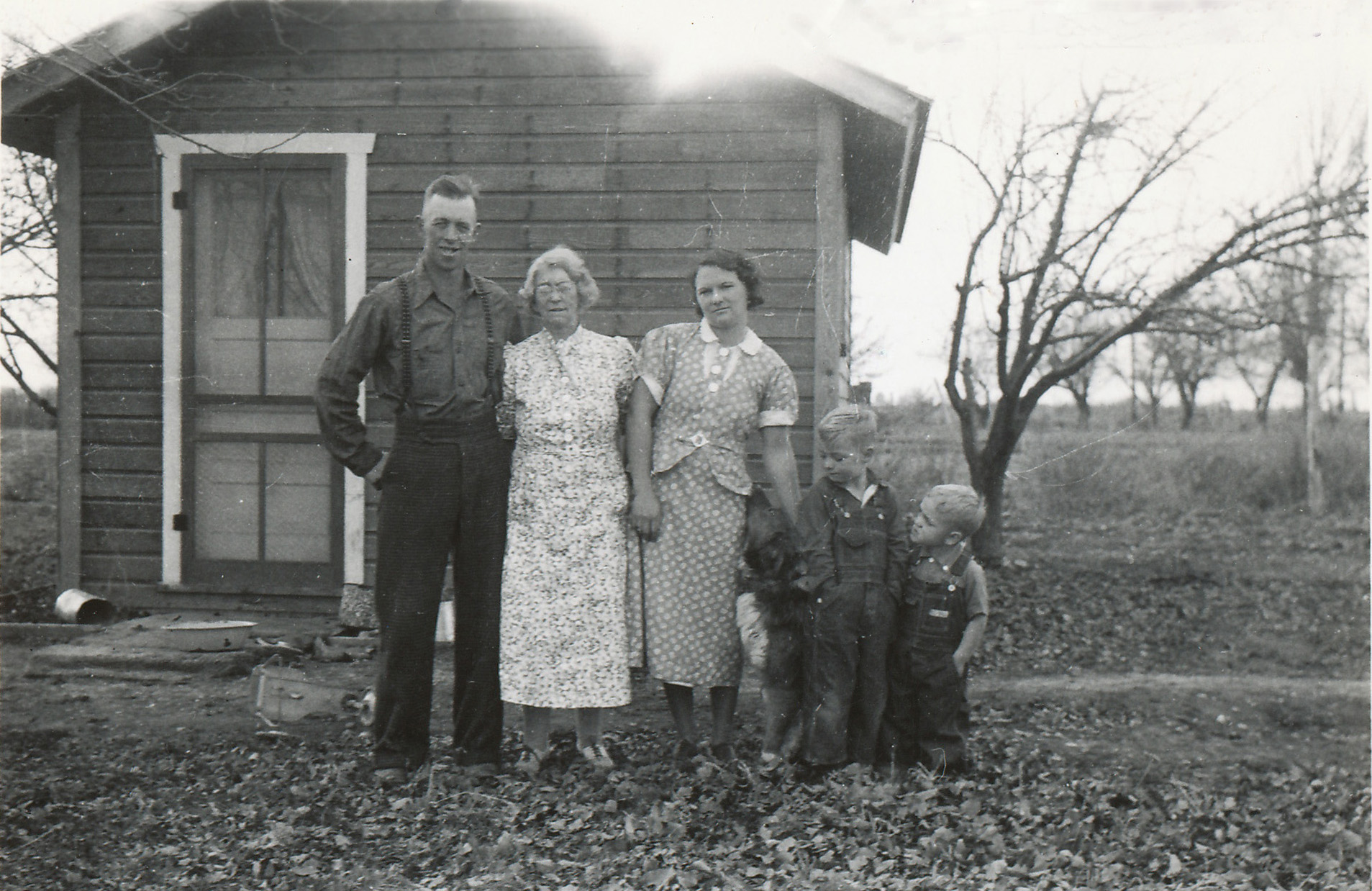
Erwin (Age 33) Thanksgiving Day, 1937
Erwin, Margrethe, Isolene, Erwin L., Dean and "Chief"
In front of Margrethe's house
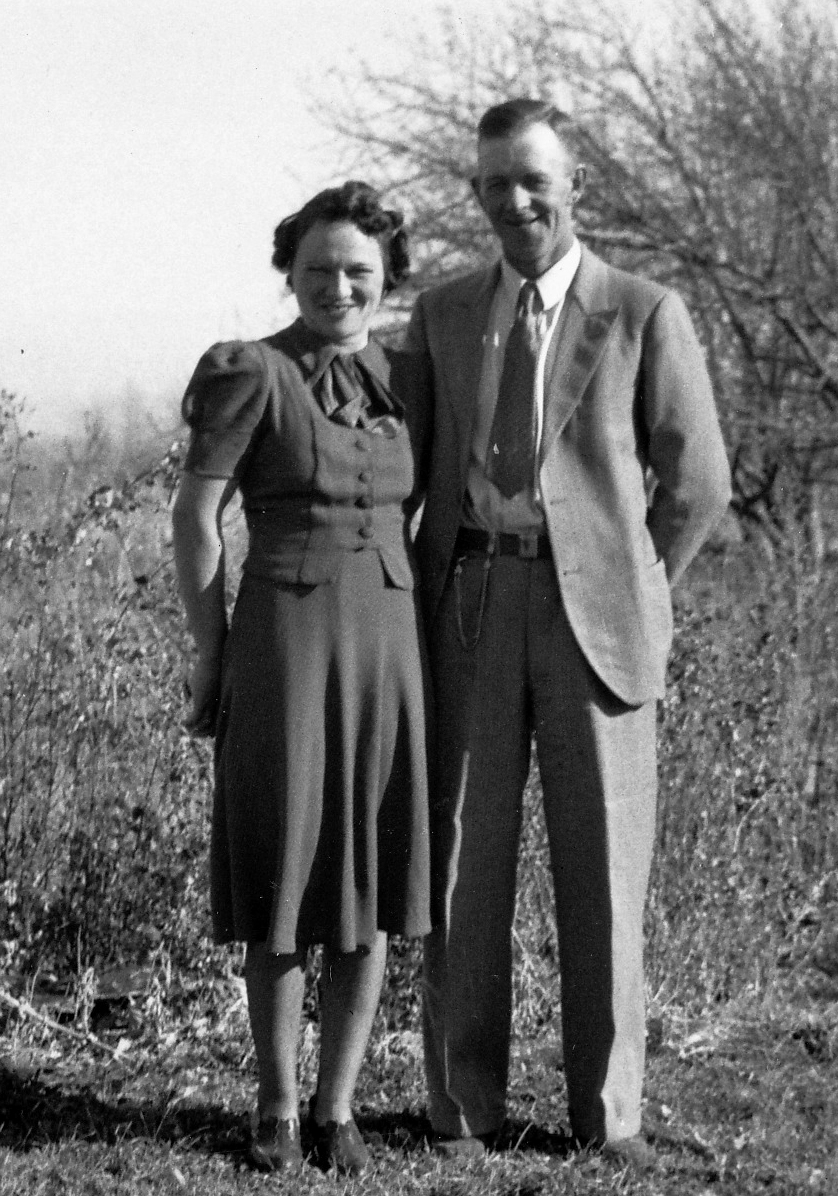
Erwin and Isolene late 1930's
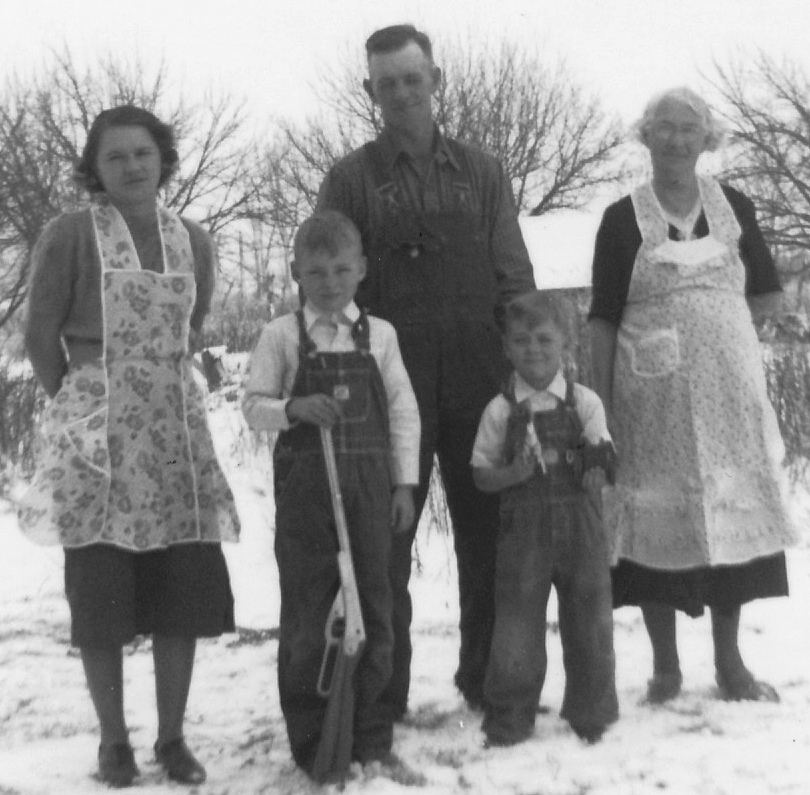
Erwin Allen ~age 35 (about winter 1939-40)
Erwin and Isolene's mother Mary Ellen Cahoon in the back
Sons Erwin and Dean in front

Erwin 1940 Census (
Entire page
)
September 20, 1940 his first daughter, Darlene was born. "My father was so excited of a daughter arriving. The next day he finished the farm chores, grabbed his "go to town hat" and was off to see mother and me -- going downtown on a few errands first before going to the hospital located just north of Kings Variety Store. He noticed everyone was so happy and smiled at him. He wondered how they could all know he now had a baby daughter. That question was soon answered when he walked in the hospital room -- where mom burst out laughing -- in his haste he’d put on his grey felt town hat over his farmer straw hat -- no wonder everyone was so happy!" (Source: Darlene Allen's personal history (pg 1)
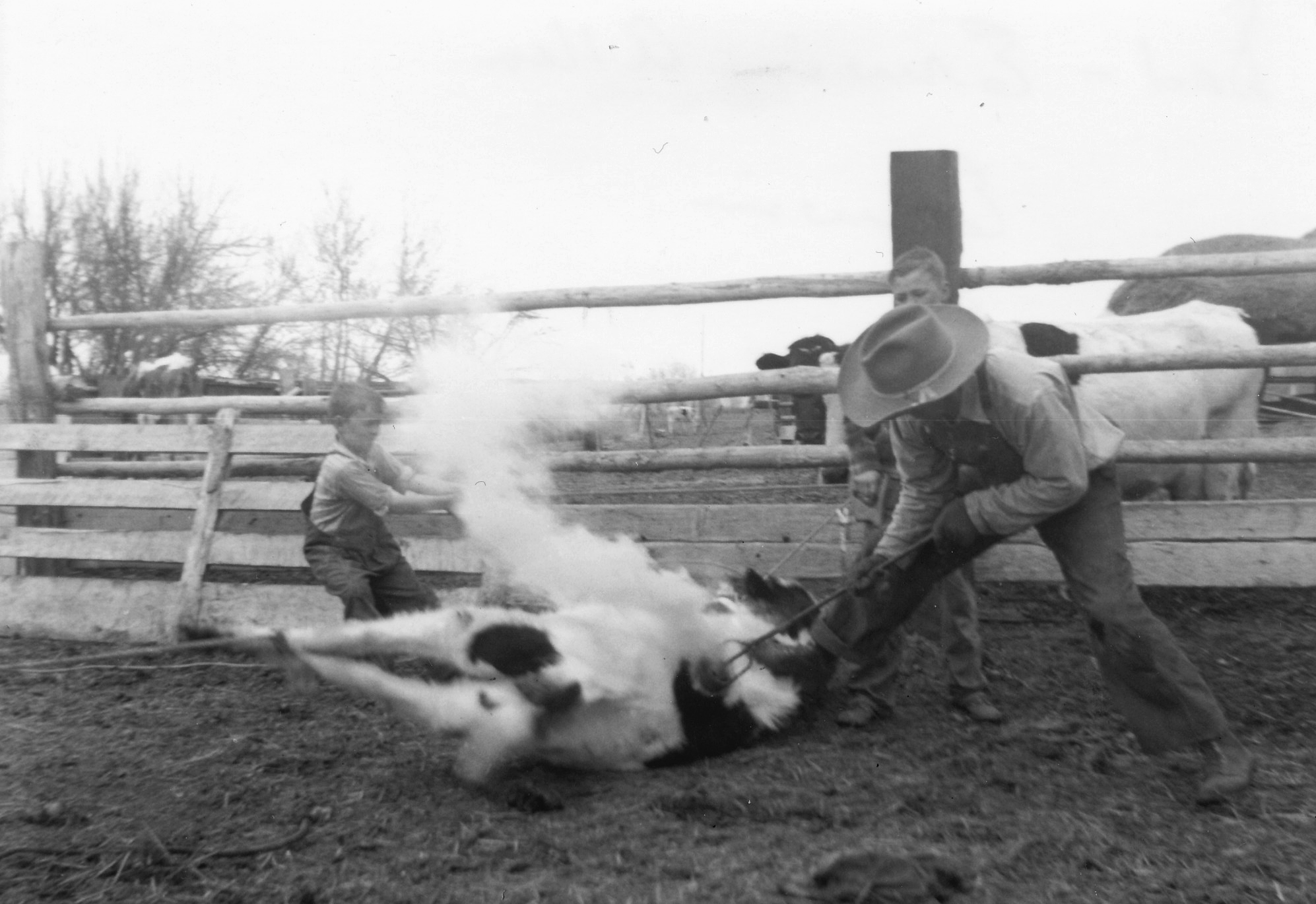
Branding calves with sons Erwin and Dean. ~1940
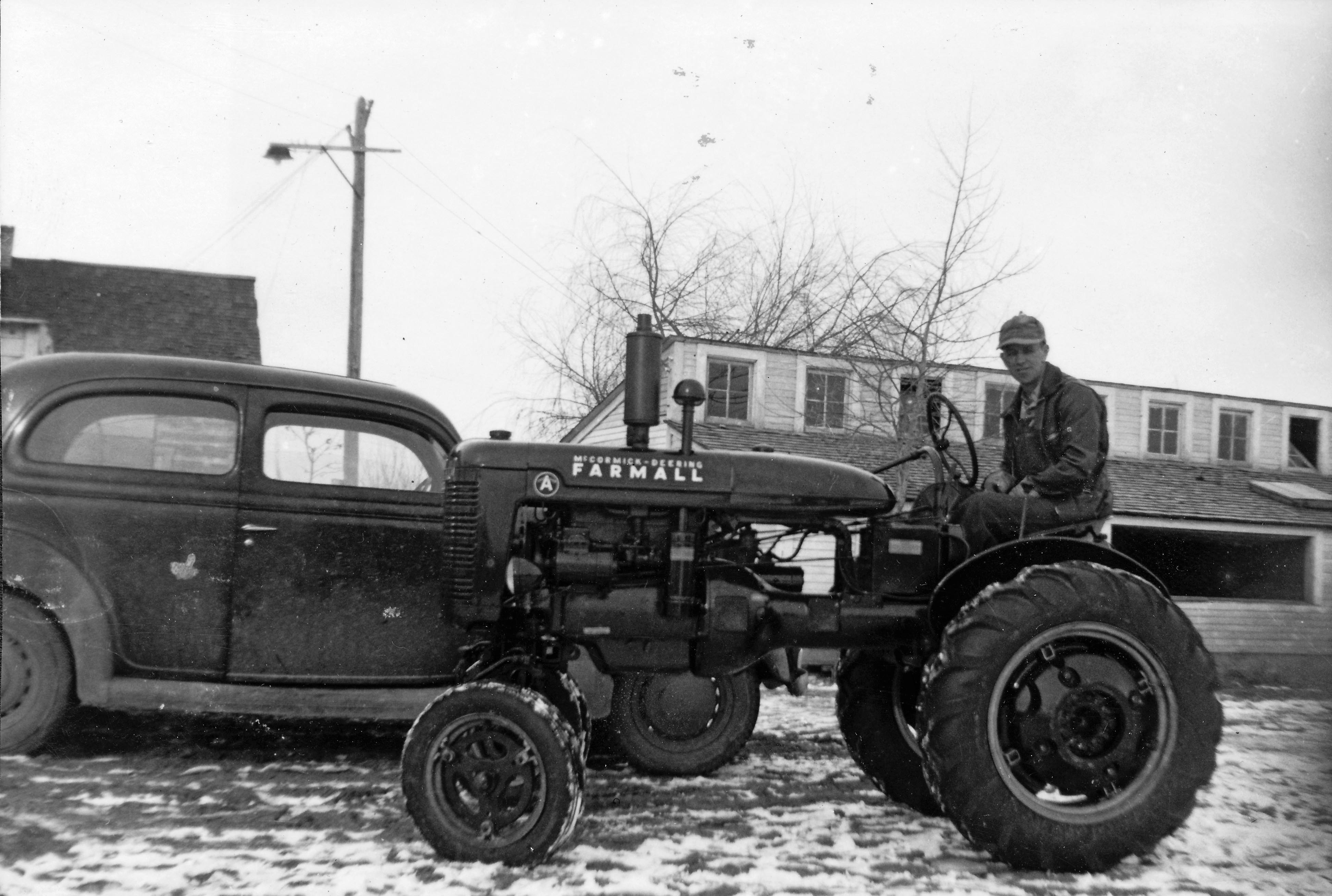
Erwin on his 1941 Farmall Tractor
Note the chicken coop on the right in the background and the old house on the left with the 1936 Ford in front.
Erwin worked for the Blackfoot School District January 1944 to 1 September 1944 (source: Allen Family LDS Family and Individual Record Book., inside front cover). The source does not specify what he did for the school.
A second daughter, June Marie, was born 8 July 1944. June Marie died 17 January 1945. She died from intussusception, a serious disorder in which part of the intestine slides into an adjacent part of the intestine and forms a blockage.
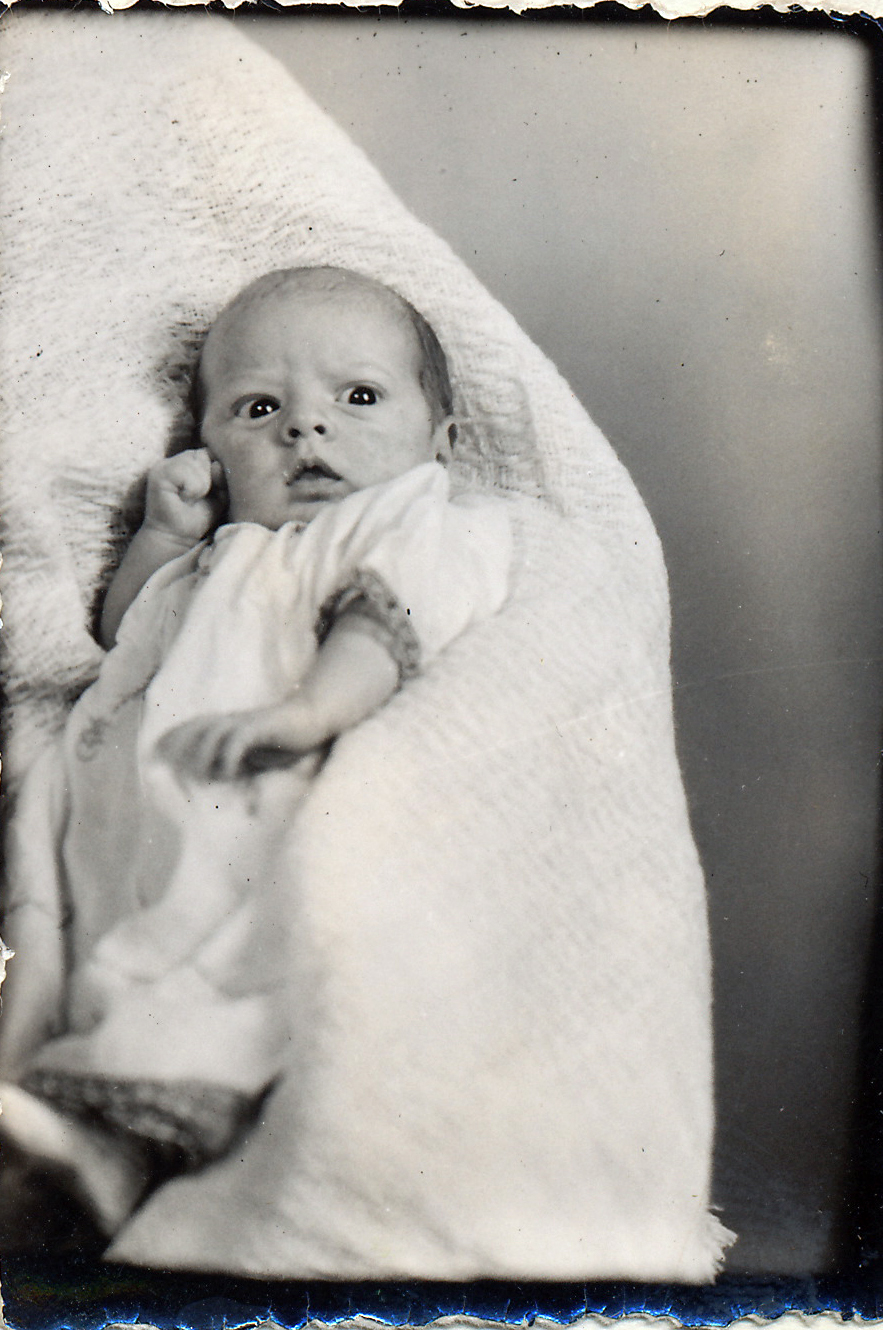
June Marie Allen
This picture is attached to her certificate of blessing
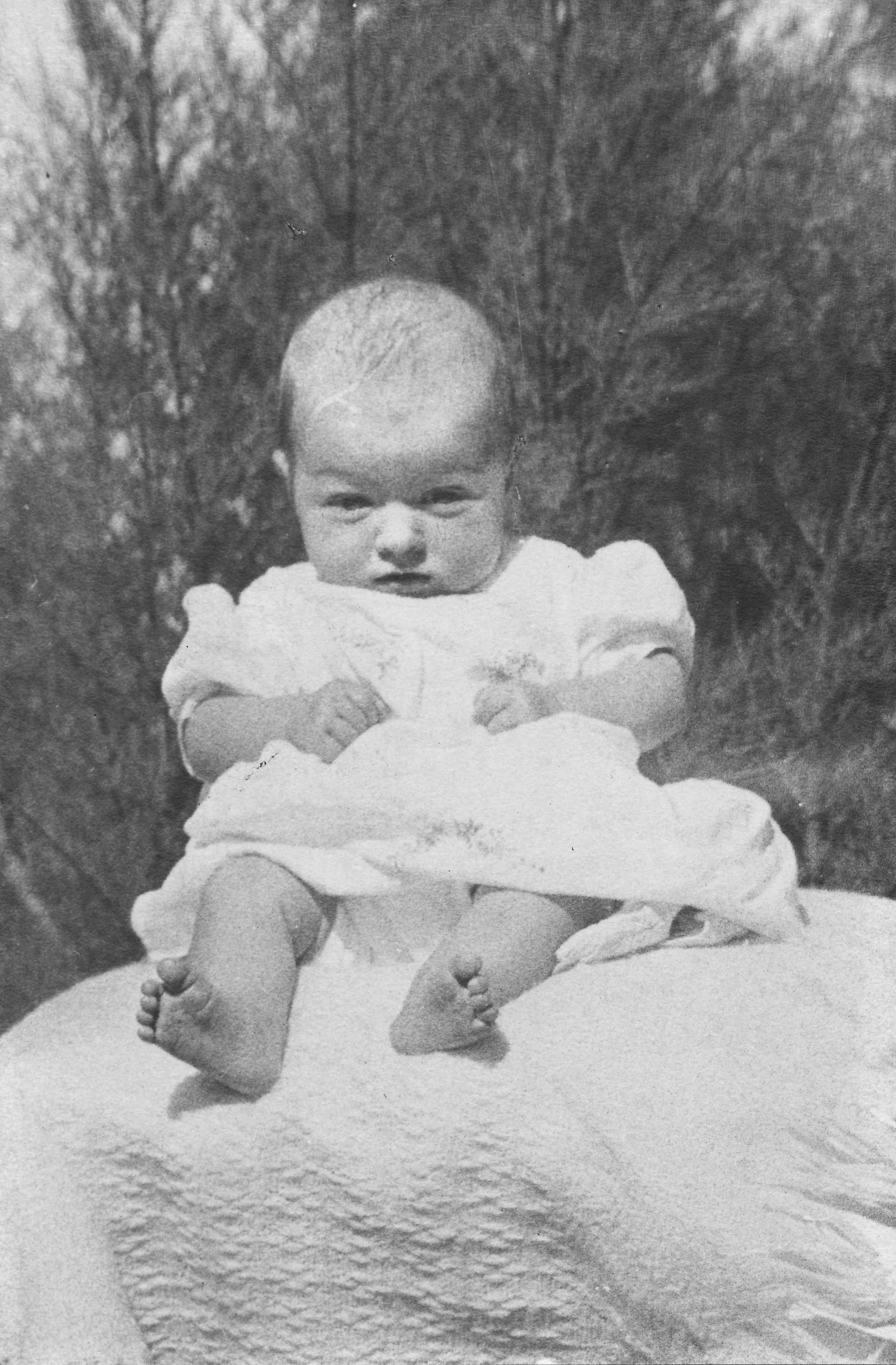
June Marie Allen
Isolene is holding her up sitting on a milk can
From Darlene Allen's personal history (pg 1-2):
"I have a memory of my younger sister, June Marie sitting on the bed in the bedroom just off the kitchen and mom playing boo and her laughing. My only other memory is walking into mom and dads bedroom and seeing galvanized wash tubs filled with bloody water. Talking to mom later in life she explained that June Marie had died from a bowel obstruction and they had rinsed her bloody diapers in the wash tubs. We were snowed in at the time of her illness. Dad and mom had rode a horse drawn sleigh to the highway and friends met them there and took them to town to the doctor. Mom said she had such a high fever before she died that the doctor told her she wouldn’t have been alright if she had lived. It seems like they took her to Pocatello for surgery but I could be wrong. June Marie died in January. Mom always said she thought June Marie and Kenneth would have looked alike as she had black hair and big dark brown eyes.
Listen to this audio of June Marie's older brother Dean and his wife Verlene talk about June Marie. Dean tells what he remembers and Verlene relates what Isolene told her about June Marie's death (recorded June 2015).
Read here about June Marie's funeral service.
Twelve days after June Marie's death, Martha Hancock, the mother of Clawson Hancock a close friend and neighbor, wrote the following poem about June Marie:
Our Babe
By Martha Amanda Richardson Hancock
January 29, 1945
Life is a precious gift to man
and tho we may not understand God’s plan
when little children O so pure
we hold with loving arms secure
and plan just what it’s life will be
this sacred gift that He has lent to me.
Alas it seems but for so short a time
this little babe I called mine
had come to bless our lives for just awhile
we were so proud to see our darling smile
but in our faith, we know, again will see
and rear their little ones in that eternity
Erwin was serving as the assistant scout master for troop 30 in 1944(source: June Marie's Funeral Service).
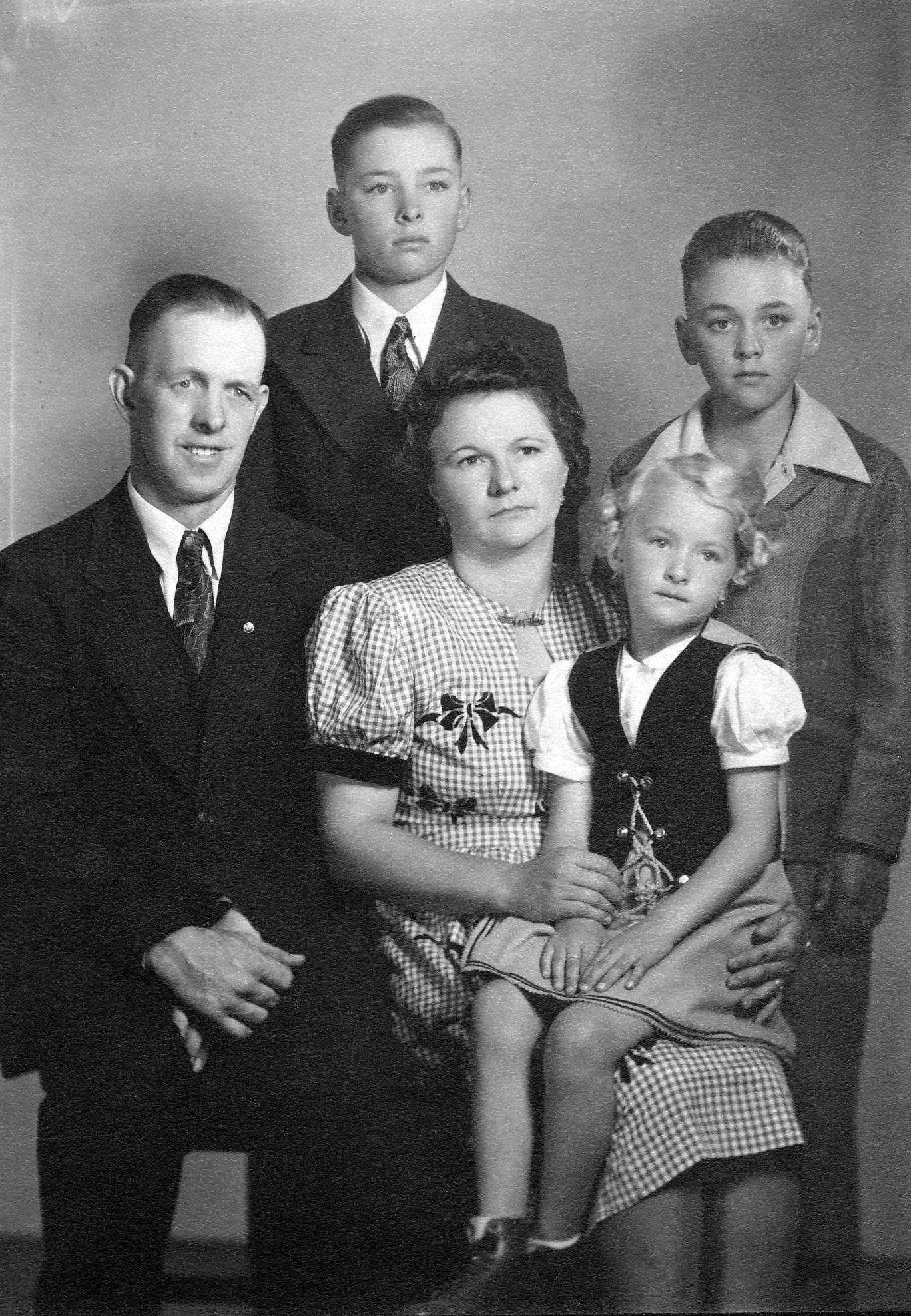
Erwin Allen ~1944 (~41 years old)
Erwin on the left, sons Erwin L. and Dean in back, Isolene with Darlene on her lap
Another son, Kenneth Allen (living) was born into the family.
From Darlene Allen's personal history (pg 1-2):
"In old house during the winter when we wanted to have popcorn to eat we would have to go to the shed and get into a gunny sack and get some ears of dried popcorn. Then we would scrape and pick off the kernels into a bowl and when we had enough to pop we would get the wire popper and pop the corn on the wood kitchen stove. You had to shake really fast so the popcorn wouldn‘t burn. Mom always let me have my buttered popcorn in a clear green bowl. In the winter and close to Christmas mom always made fudge to drizzle over your very own“ tin“ pie plate of popcorn. To test if the fudge was “done“ you would take a tablespoon of fudge out of the pan and stir it with a match stick. If it set you beat the entire batch with a spoon....no mixer.. and then poured it over the popcorn. Another winter treat was “Bear Signs.“To make bear signs you go down to the big spud cellar and get the perfect size spud. You wash it, peel it and then slice it just the right thickness and lay them very carefully on the top of the green kitchen stove. In the old house when I came home from school. the very first thing I did run up stairs and get to cookies. Sugar cookies or macaroons. Mom bought them by the case and they always set at just the top of the stairs.
The spud cellar was also the garage for the car in the winter. When we were snowed in the winter of ’49 we were plowed out by a caterpillar tractor with a blade on it. He made a couple of pushes with the “cat“ past the spud cellar and we spent all afternoon shoveling snow so we could go to town. Lots of snow that year. The cows could just walk over this corral fences. When the wind blows all the snow drifts into the road. Mom(Isolene) would always warned me not to go near the telephone wires as the snow was so deep you could touch the wires. We had 49 dozen eggs in the house because you couldn‘t get to town to sell them.
Sometime during our years in that house mom Isolene painted our kitchen floor. They didn’t have the money for new linoleum so she painted it a light tan and then took a sponge and dipped it in brown paint and put splotches all over the floor. The floor was beautiful and it was super fun to walk and bounce on the narrow boards that were elevated over the floor so we could get around until the paint dried.
During thunder storms you could go upstairs and open a door and watch the lighting. The door did not lead anywhere just open space to the ground. The kitchen stove chimney was on the wall between the two upstairs bedrooms and one time it got so hot it caused a fire. The scare of the fire and the hard work of clean up caused mom to have a miscarriage. This was sometime after June Marie died and before Kenneth was born.
In the 1930's and 1940's Erwin primarily raised potatoes and beets on the farm. He had milk cows as well. As his older boys (Erwin and Dean) left for college he transition to more of a dairy farm. Listen to this audio as Dean described his father's farming in the 1930's and 1940'w and this transition to a dairy farm.
Dean describes an incident when he was 11 or 12 years old (about 1946) where Erwin had him cultivate beans for the first time. He describes this incident illustrating how his father father was never abusive but how he did discipline Dean. Listen to the
audio.
"He (Erwin) also laid the hardwood floors in the State Hospital South in Blackfoot and for the old Blackfoot High School which is now a sixth grade complex. He also spent a lot of time clearing sage brush in American Falls. I taught a Relief Society class at American Falls' ward taking mom (Isolene Tolman Allen) and Aunt Lavaughn (Tolman Fowler) with me. As we were driving to Joan's house (Joan Baird Phillips' farm outside American Falls), Mom (Isolene), pointed to this field and that field saying 'That is where your dad, Erwin, cleared sage brush'."(Source: Darlene Allen's personal history (pg 12)
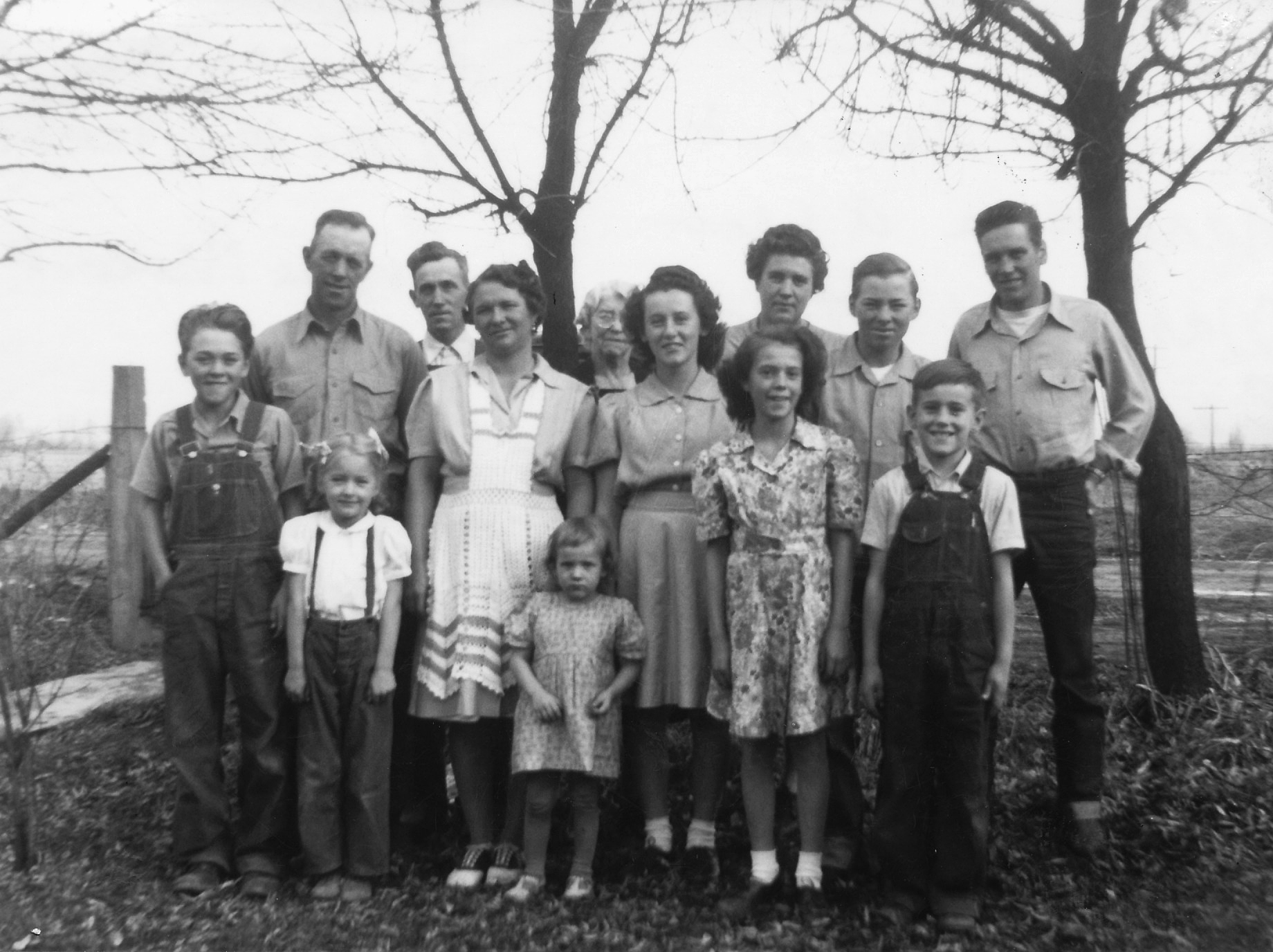
The Allens and Hancocks 1946
Back Row L-R: Erwin Allen, Clawson Hancock, Margrethe Teslie Allen, Margaret Hancock, Erwin L Allen, Rulen Hancock
Front Row L-R: Dean Allen, Darlene Allen, Isolene Tolman Allen, Verna Hancock, LaDeen Hancock, Zelma Mae Hancock, Eugene Hancock
The Hancock family was great friends with the Allen family. Clawson and Erwin were great friends. In an email to me Gene Hancock (front row far right in the above photo) wrote: "We have many great memories of camping trips and other activities we did with the Allen family. My Mom worked many years with your Grandma with the school lunch program at the Wapello school. I remember your Great Grandma Allen who lived in a little home behind your Grandparent’s home in Wapello. The first bicycle I learned to ride was at your grandparents home. Memories, memories. I have many good memories of the Allen Family."
Clawson Hancock and Erwin loved to go hunting and fishing together. The photo below is the happy hunters with their prizes. The photo after that is one of their camp. These are sometime in the late 1940's to early 1950's.
From a tribute written by Verna Hancock to her mother Margaret Hancock: "Many trips were enjoyed by you and Isolene and her husband. One time you were Salmon fishing and it seemed the fish was quite near the bank when the line broke. Isolene jumped onto the fish and locked her legs and arms around it until someone helped them out of the water. Her wet nothings were the worst.
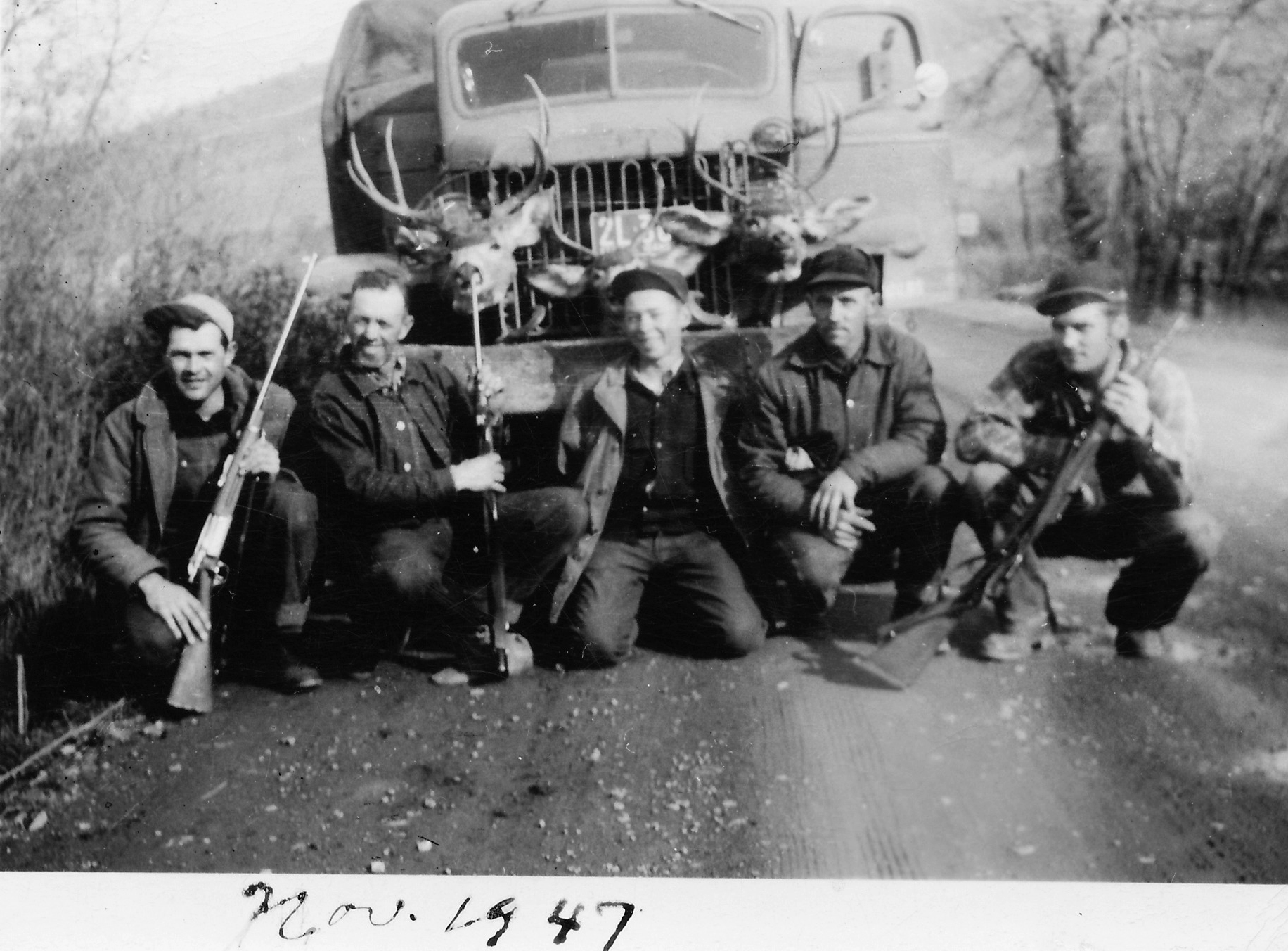
"Happy Hunters"
L-R: Lester Neilson, Erwin, Erwin L, Clawson Hancock, Rulen Hancock
Erwin loved to go fishing. In the 1940's up until the late 1950's he would go fishing up wolverine creek. Listen to this audio of "Fish Friday's" as told by his son Dean Allen.
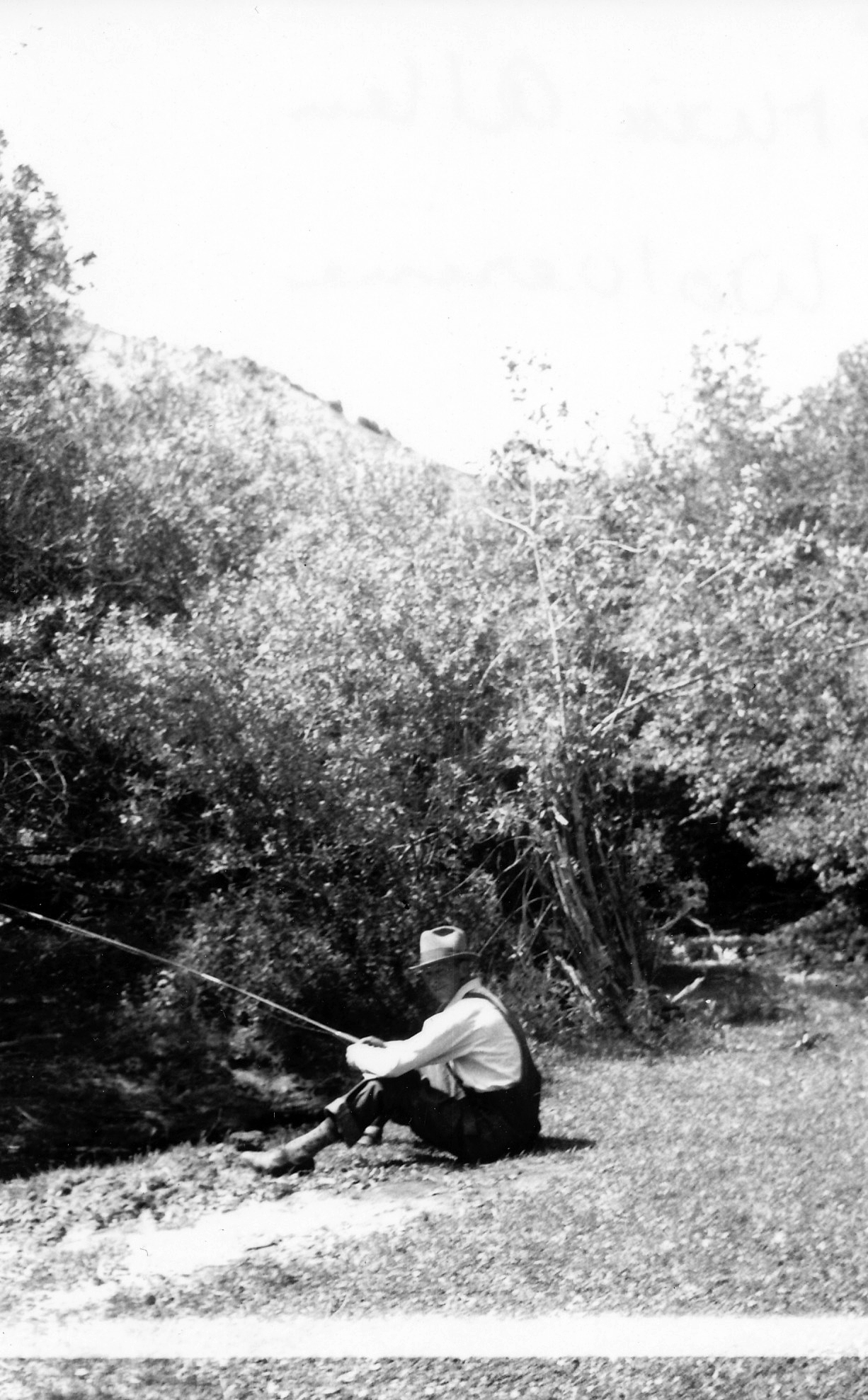
Erwin fishing up Wolverine
In 1948 Erwin started building a new house just to the north of the old house. The new house was made from cinderblocks. About 6-7 years later a brick facing was placed on the house. Listen to this audio of Dean Allen describing building the house. He was 13 years old at the time the house was started. Below are pictures from 1948 and 1949 showing the building of the new house. You can refer to these pictures at different points while Dean is speaking. Dean refers to Erwin using a "slip bottom scraper" drawn by a tractor to begin digging out the basement. It is otherwise called a "slip scraper" or "drag scraper". I gave earlier in this page a link where you can see the description of a slip scraper. Here is a video of a animal drawn slip scraper in action. If you watch that video you can see why Erwin was willing to pay someone to bulldoze out his basement.
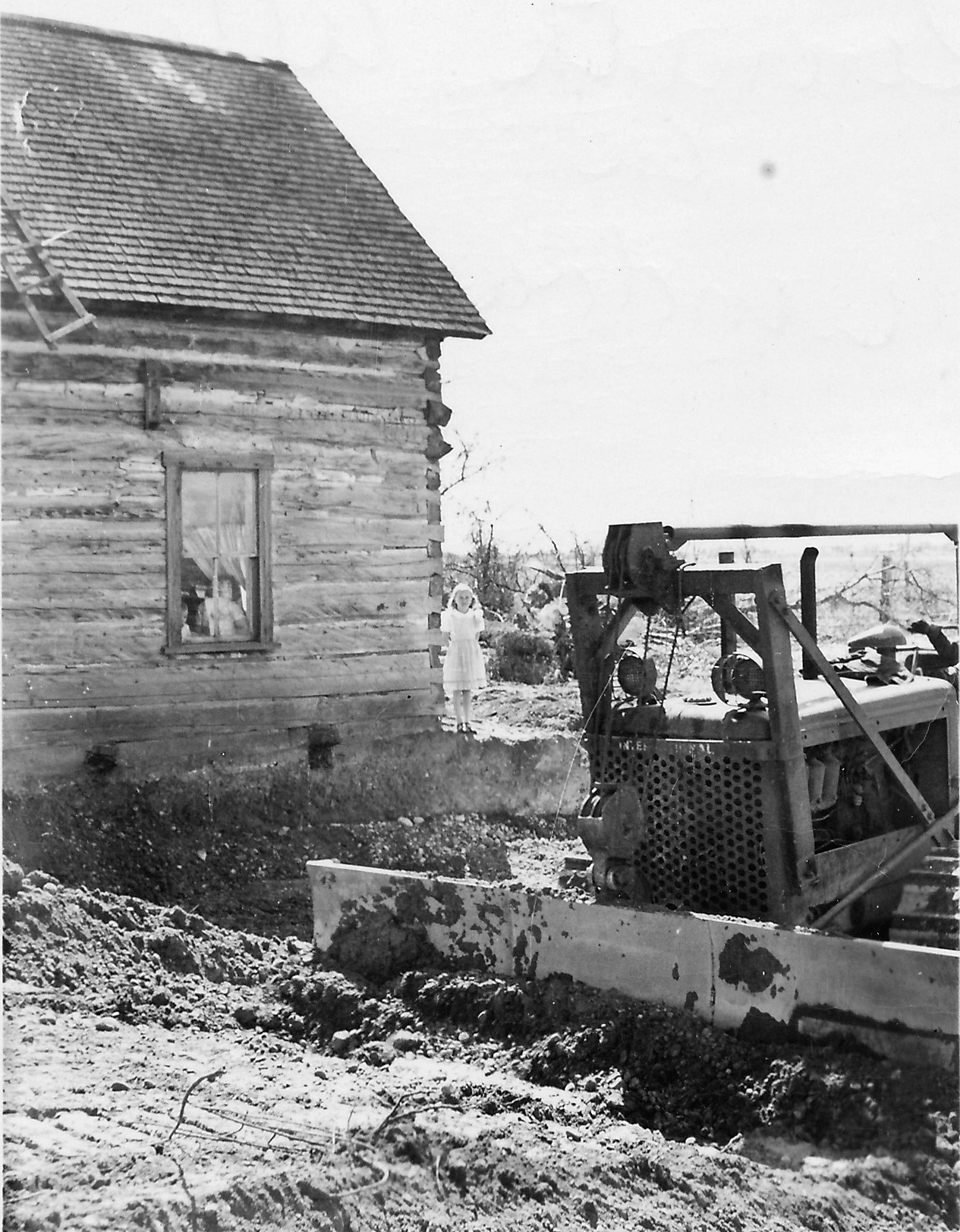
Bulldozer digging basement on the new house
Darlene is standing next to the old house and Kenneth is in the window looking out.
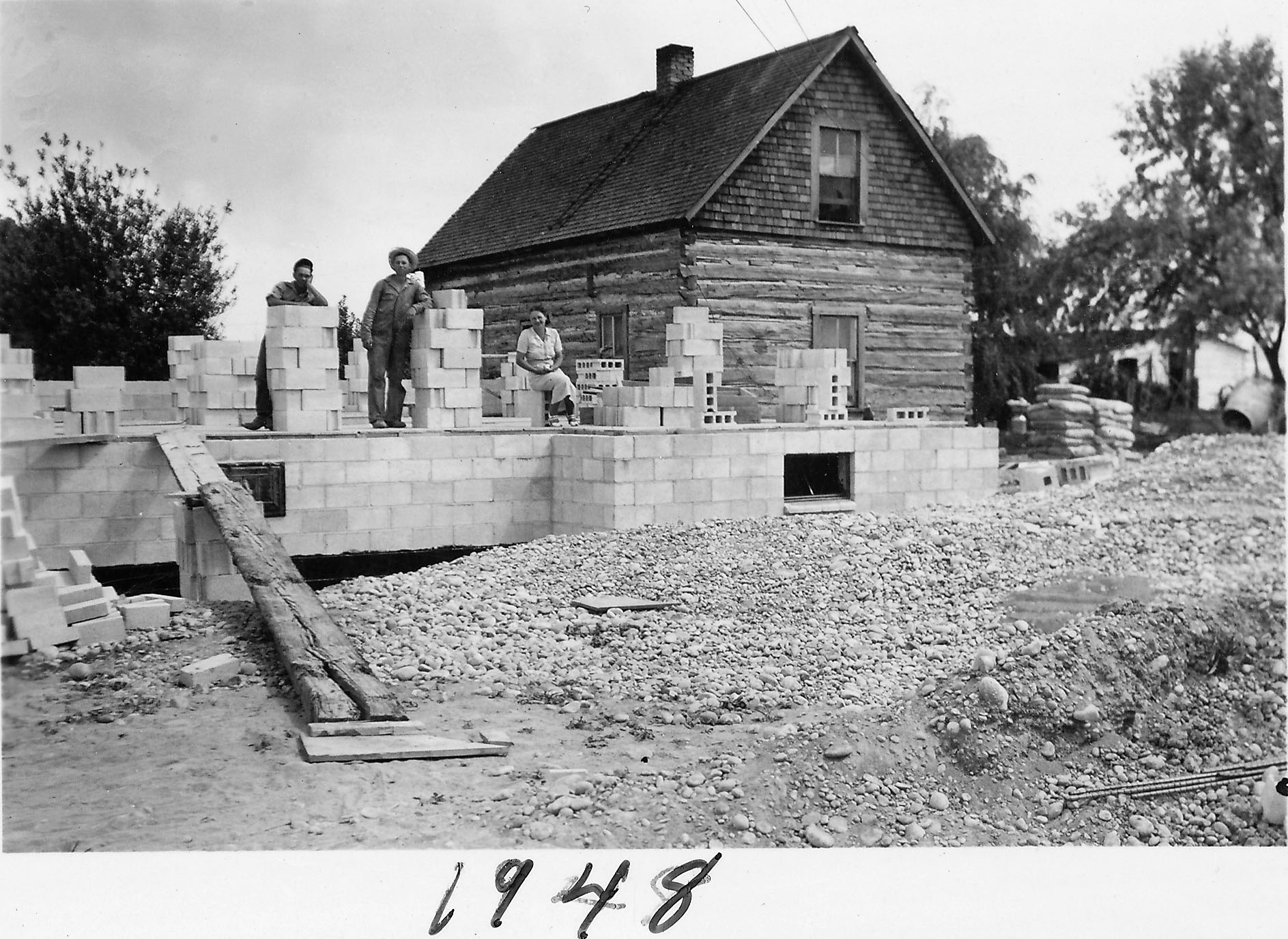
New house partially completed.
Erwin, Dean, and Isolene
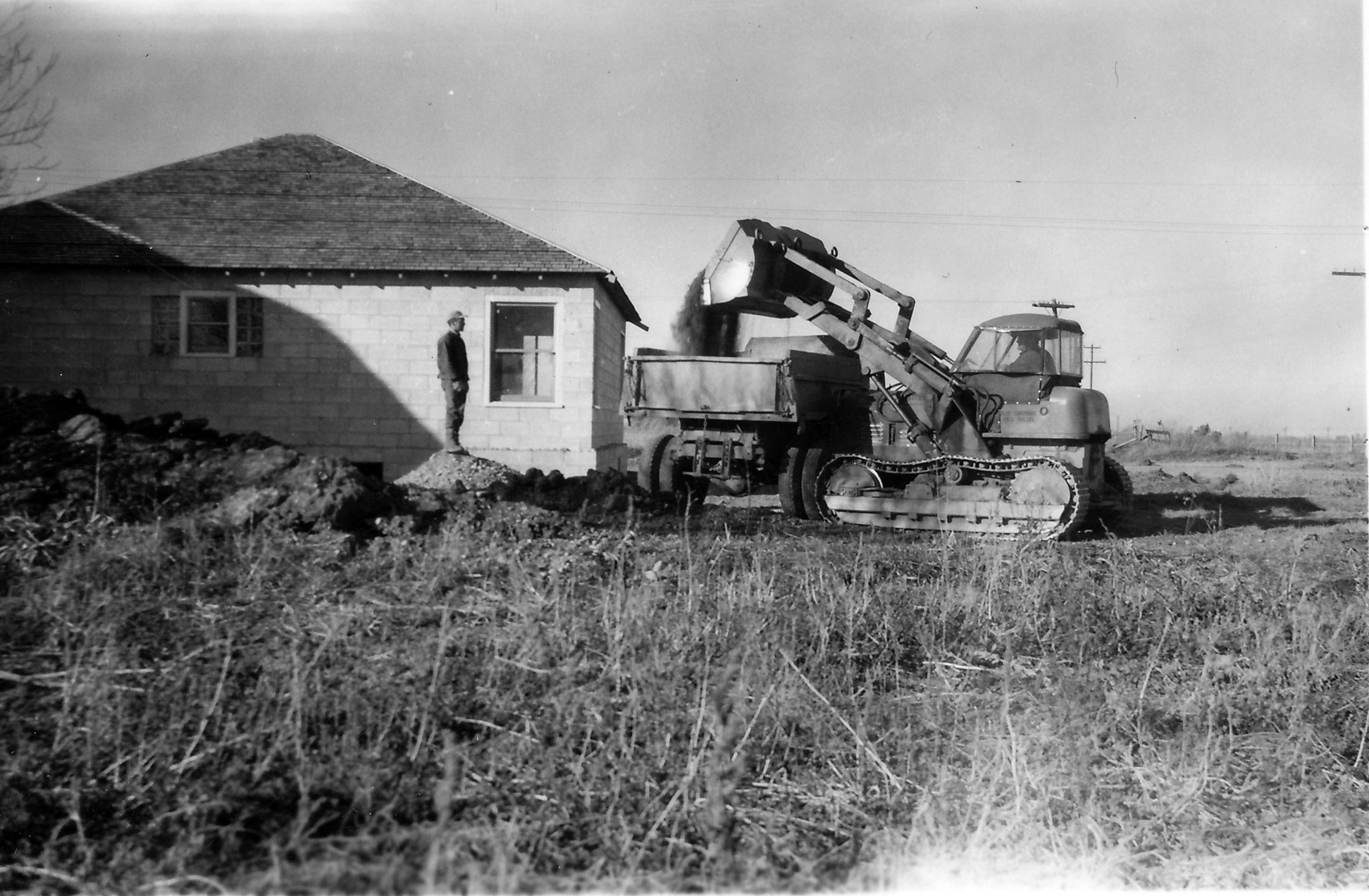
New house Fall 1949
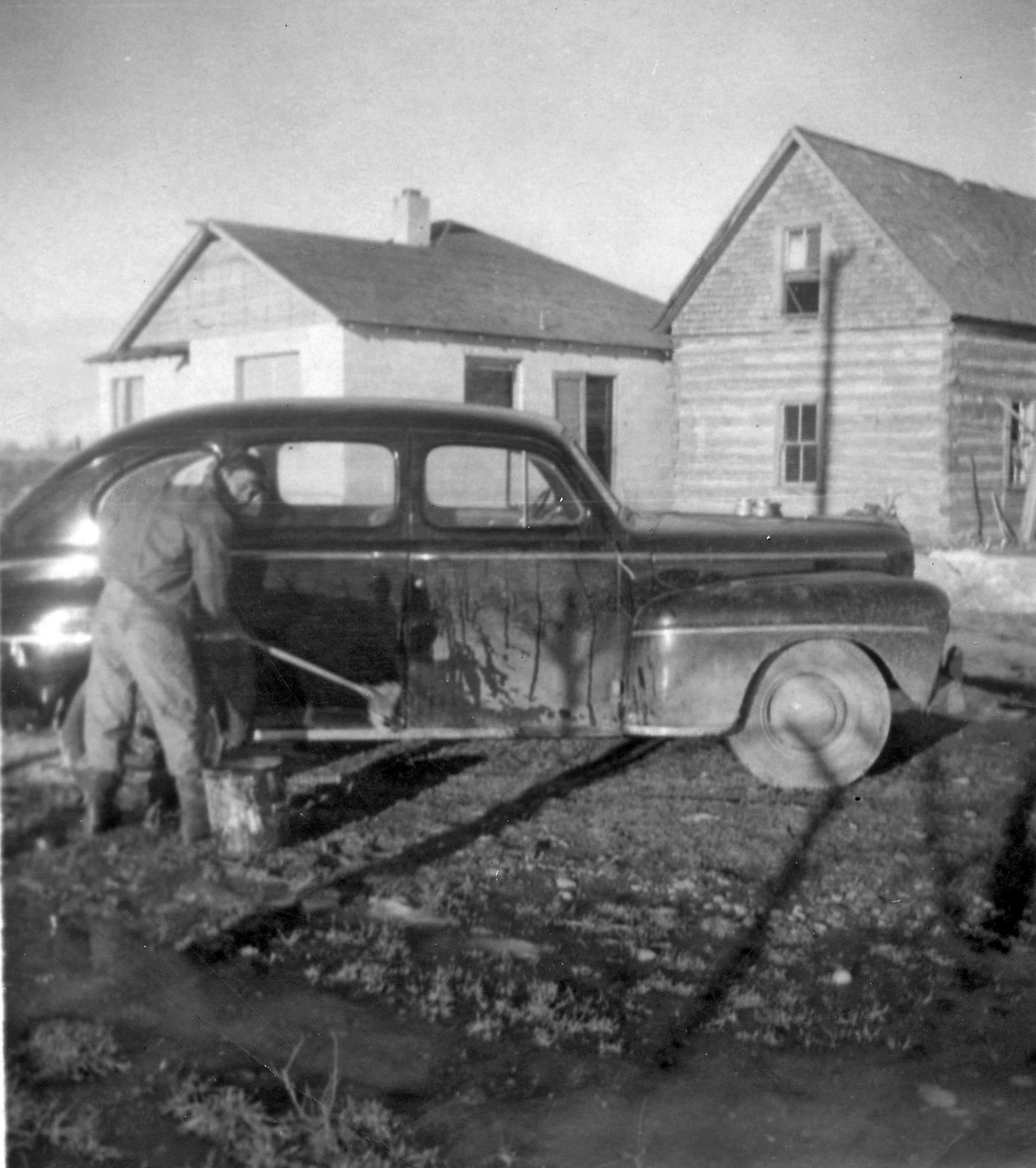
New and Old houses 1949
Son Dean Allen washing the 1936 Ford
From Darlene Allen's personal history (pg 10):
"In the summer our dads would hay together. Dad was the stacker, I was the derrick driver. I liked to work at George Bithell place. He would pay me two dollars a day. It was nice to have George drive in with his load of hay for he was a whistler and he perked up the long day with his music. Another exciting part of the day was when his wife Cora would bring out the lemonade...NOW... if a hen had hopped up on the haystack the night before...Well, dad would wait til Cora came out with that lovely cake and he’d holler down to her “Just a minute I‘ll be down for your dessert just as soon as I get my stomach fixed“ and he’d make a big production of cracking a fresh laid egg in front of her and swallowing the raw egg. Now we‘d never heard the expression “Oh, gross“ but that would be Cora’s reaction.
It was a long day of work. Starting before eight and quitting at six. We would eat dinner at the house we were working at. The women would help each other with the cooking and just move from neighbor to neighbor as the men traded help with the haying. The women worked as hard cooking as the men haying.
Before you could haul and stack hay it had to be mowed and raked. What a crew we had. Dean was the mower. I side raked and dad followed with the dump rake. I raked three rows of Dean‘s cut hay into one larger windrow. This was a tricky operation because a side rake can only turn in one direction and you had to rake the third row of mown hay into the first and second. The first two trips around the field was driven in the same direction. At the end of the second round you made a figure eight to send you back in the same direction you had just came. Of course it was against the rules to slow down at the ends of the row you to make this figure eight and dad would be unhappy if made a big wide turn and rolled all the hay into a big ball and risk breaking the rake. So you just drove smooth and paid attention to what you were doing. I started raking hay when I was eight. After I raked the hay in nice neat windrows dad came along with the horses and dump rake. This rake scooped the hay into nice little piles. Dad had to judge the size of the piles and stomp his foot down on a lever that lifted the rake up so a pile could be made. Acre after acre he would stomp his foot down to make a field of little piles of hay. If I didn’t make nice smooth windrows of hay it goofed up his raking and he would have to get down of the rake and straighten the tines of the rake."
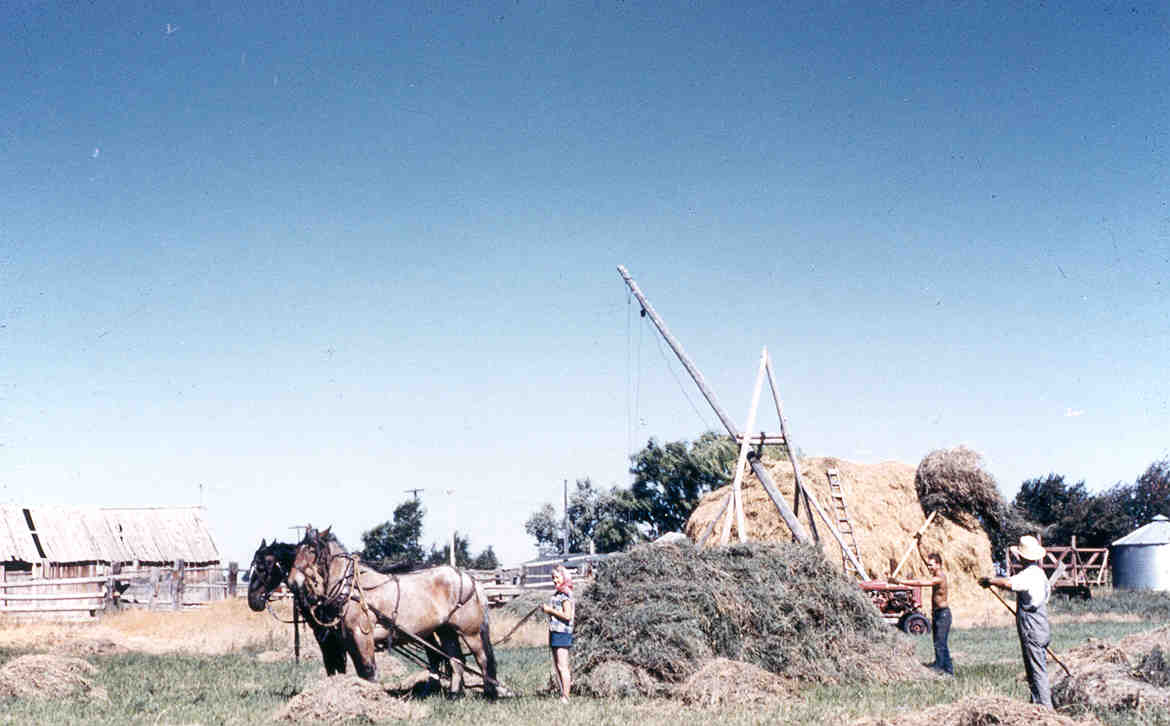
Darlene with the horses ("Toot" and "Donk"), Dean behind the hay and Erwin on the right
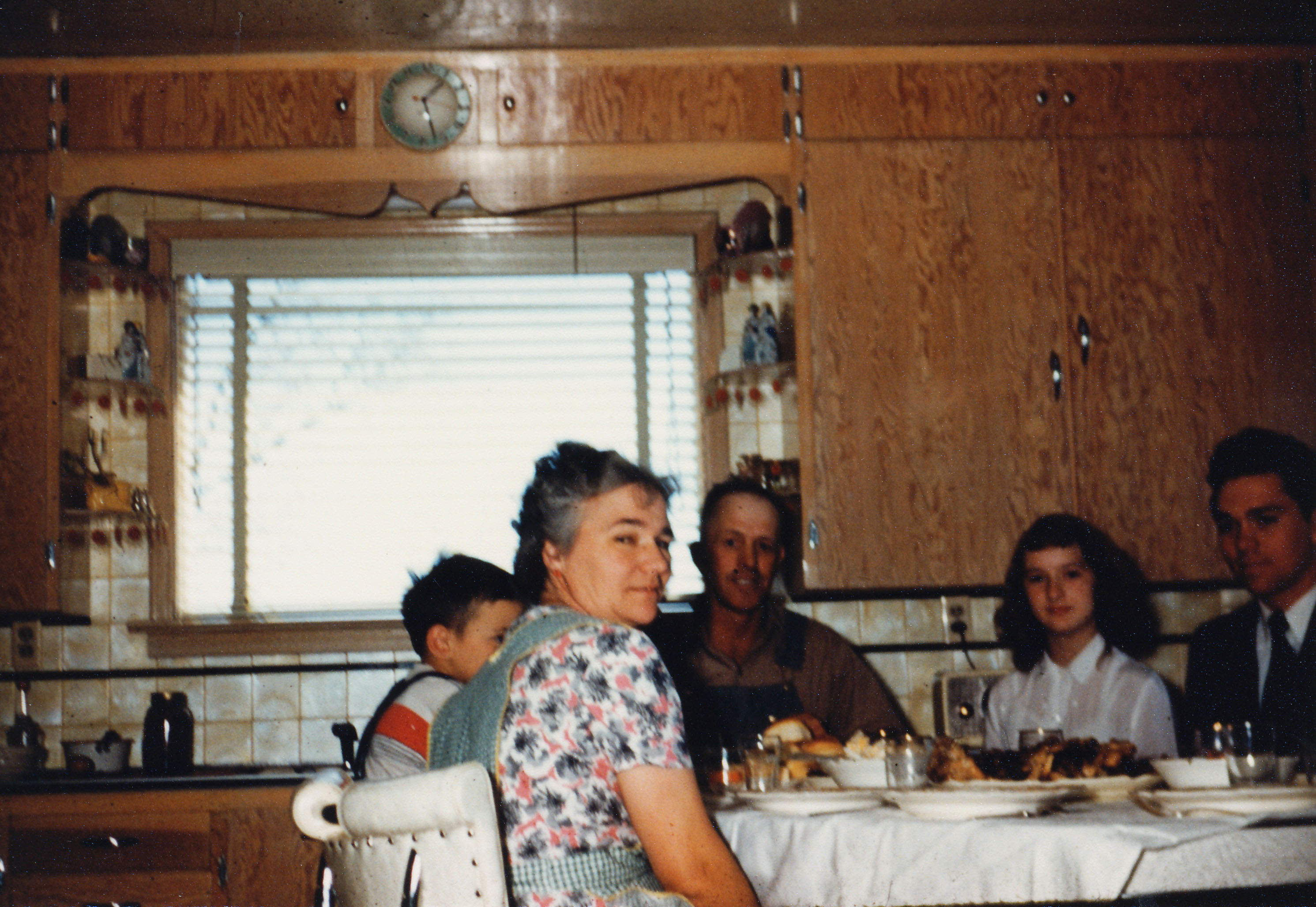
Allen Family at Dinner ~1954
Isolene, Kenneth, Erwin, Darlene & Dean
From the History of Lavaughn (Tolman) Fowler, pages 26-27:
The Allen family were a very close family. They would work hard, then Erwin would take them all to Summit or some favorite place to fish. Many times just up Wolverine (East of Blackfoot Idaho) to picnic, get some pictures, go for walks, just for fun somewhere. For many years the Allens and Fowlers spent many hours together. One year we went to Bryce Canyon and Wolverine Canyon for picnics. We would go to parade, back to Isolene's and Erwin's home. We'd have a feast. Then go to the fair. Visit the many booths, the animals, many times to races and afternoon entertainment, then go do chores and then back for the night shows. A hamburger and drink. About eleven o'clock say good night. They'd go home and we would drive home after a fun day, and evening of entertainment.
In the late 1940's and early 1950's besides working the farm, Erwin worked at Grimm Growers in Blackfoot. Before work he would milk the cows and do the morning chores with the help of his daughter Darlene (the older two boys were grown and from home by this time). He would then work at Grimm Growers from 8 AM to 6 PM arriving home about 6:30 PM to then milk the cows and do the evening chores.
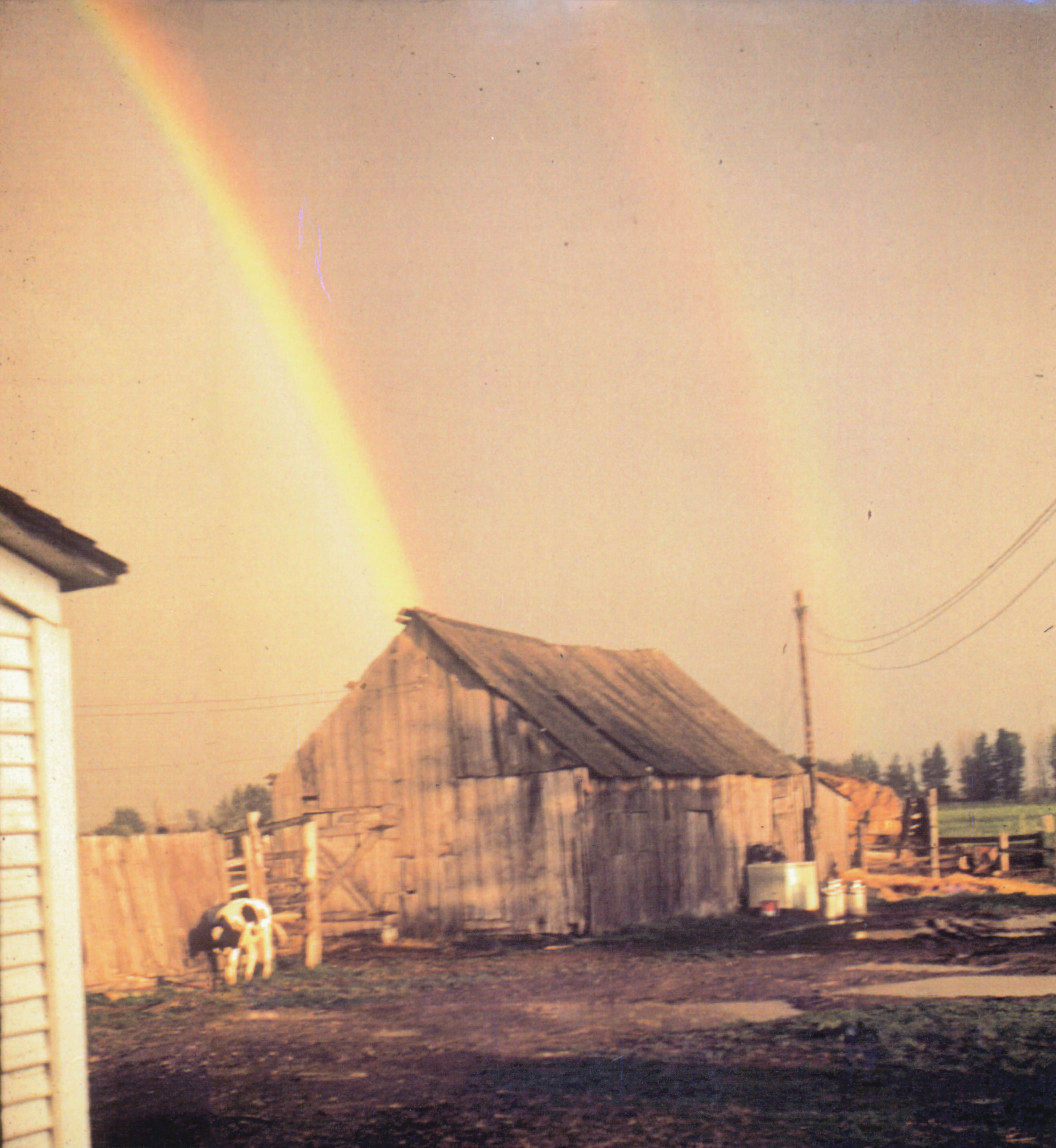
The Barn on the Farm
For 10 years he served on the Wapello School Board. For 2 of those 10 years he drove a school bus. The exact dates are not known. Best estimate is from 1945 to 1955.
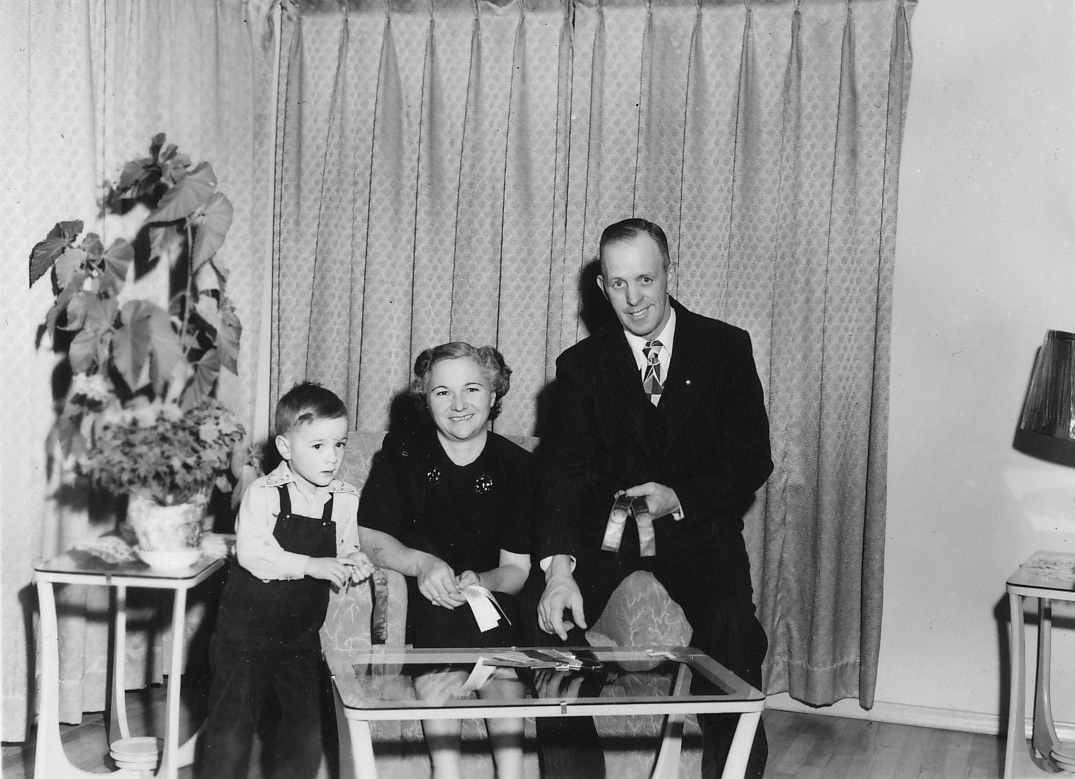
Kenneth, Erwin (age 50) and Isolene in the new house in 1954
6 Feburary 1955 Erwin was called as an assistant ward clerk in the Wapello ward. On the 12 June, 1955 he was called as the ward clerk (source: Allen Family LDS Family and Individual Record Book., pg 31). According to the announcement in the newspaper for Erwin and Isolene's 50th wedding anniversary, he at some point served as scoutmaster
December 1, 1955 Erwin once again started working for the Blackfoot School District as the school lunch supervisor, delivering food supplies to the different schools. He worked there continuously until retirement in 1970.
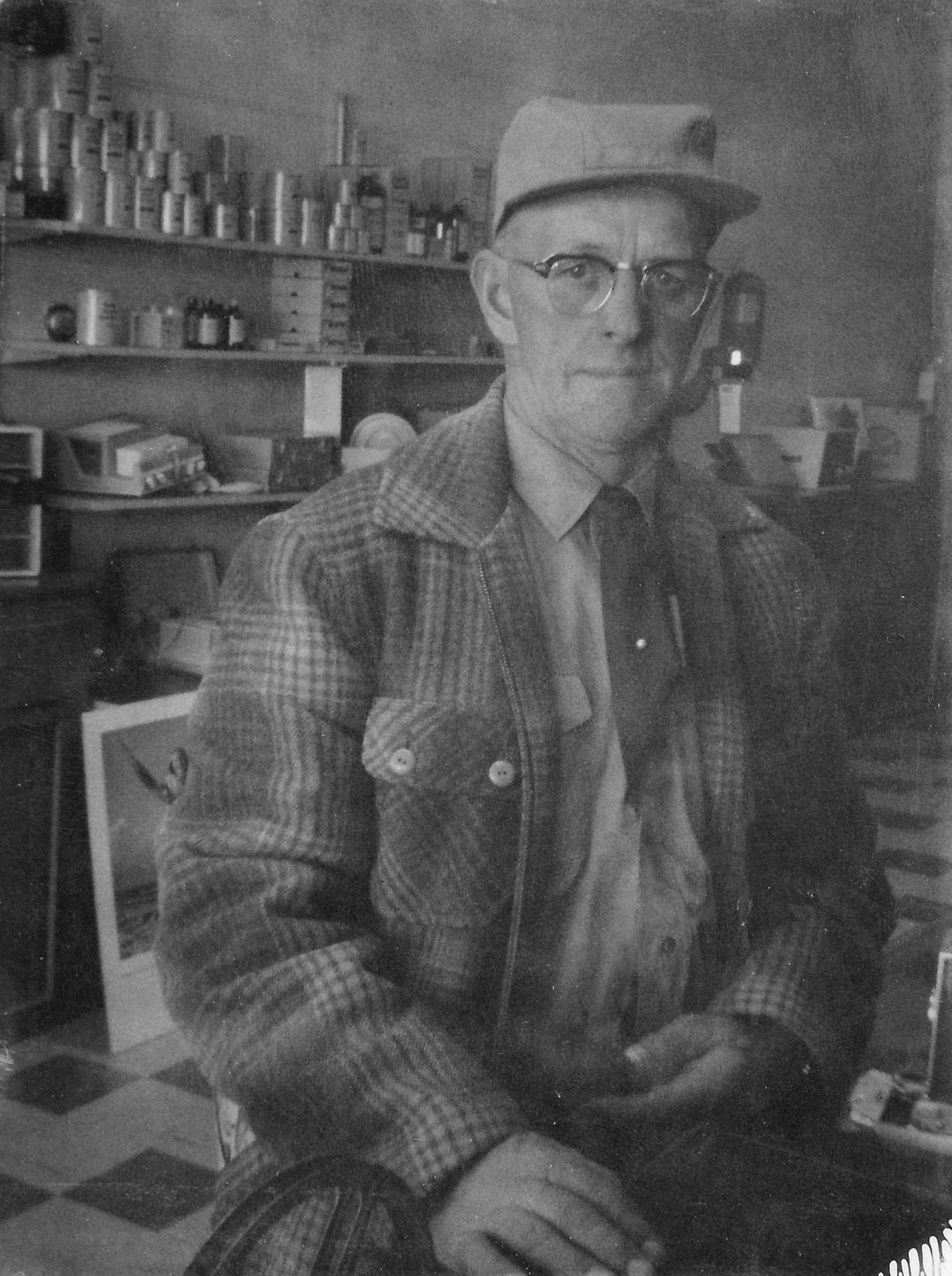
Erwin at the time of working for the school district
Photo taken in the basement of the central school in Blackfoot where Lunch supplies were stored
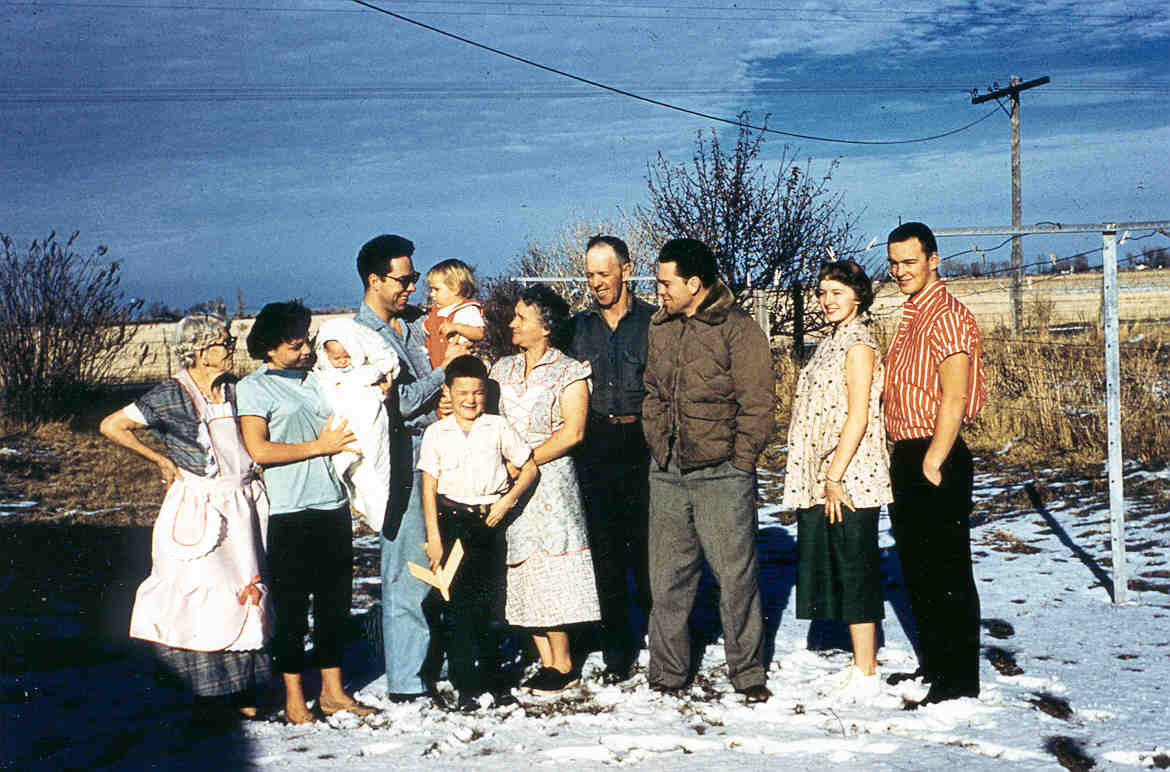
Erwin Allen Family Christmas of 1956. Erwin (center) age 42
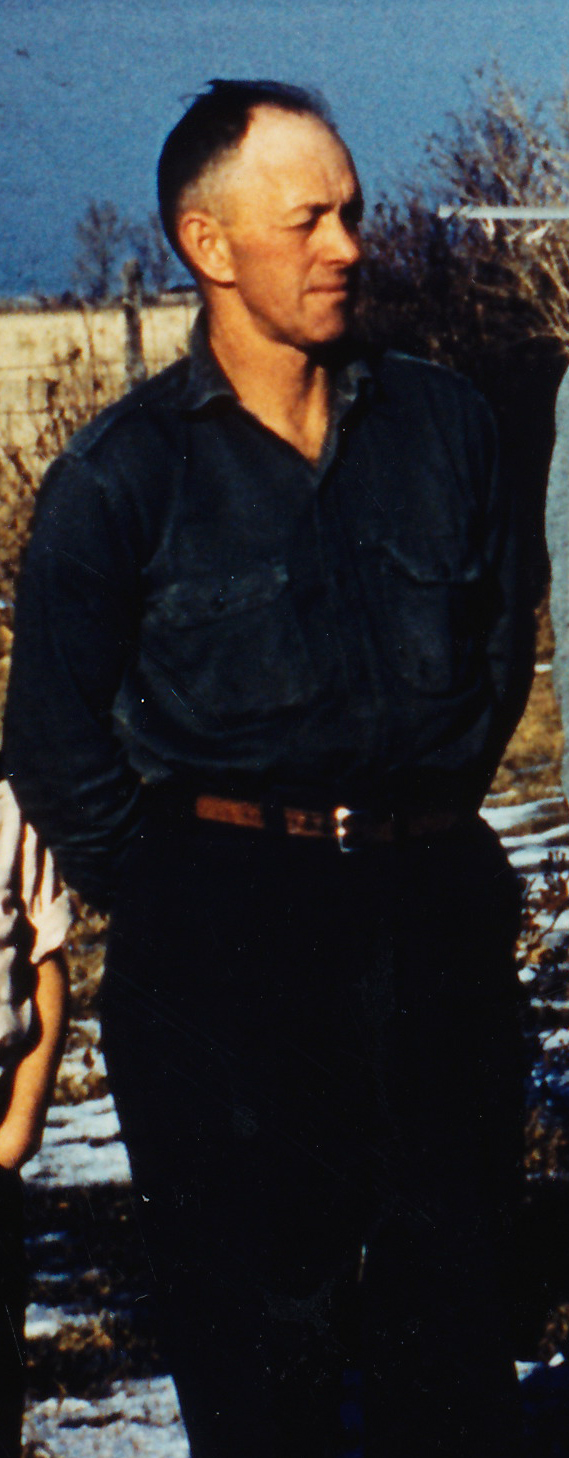
Erwin Allen Christmas 1956
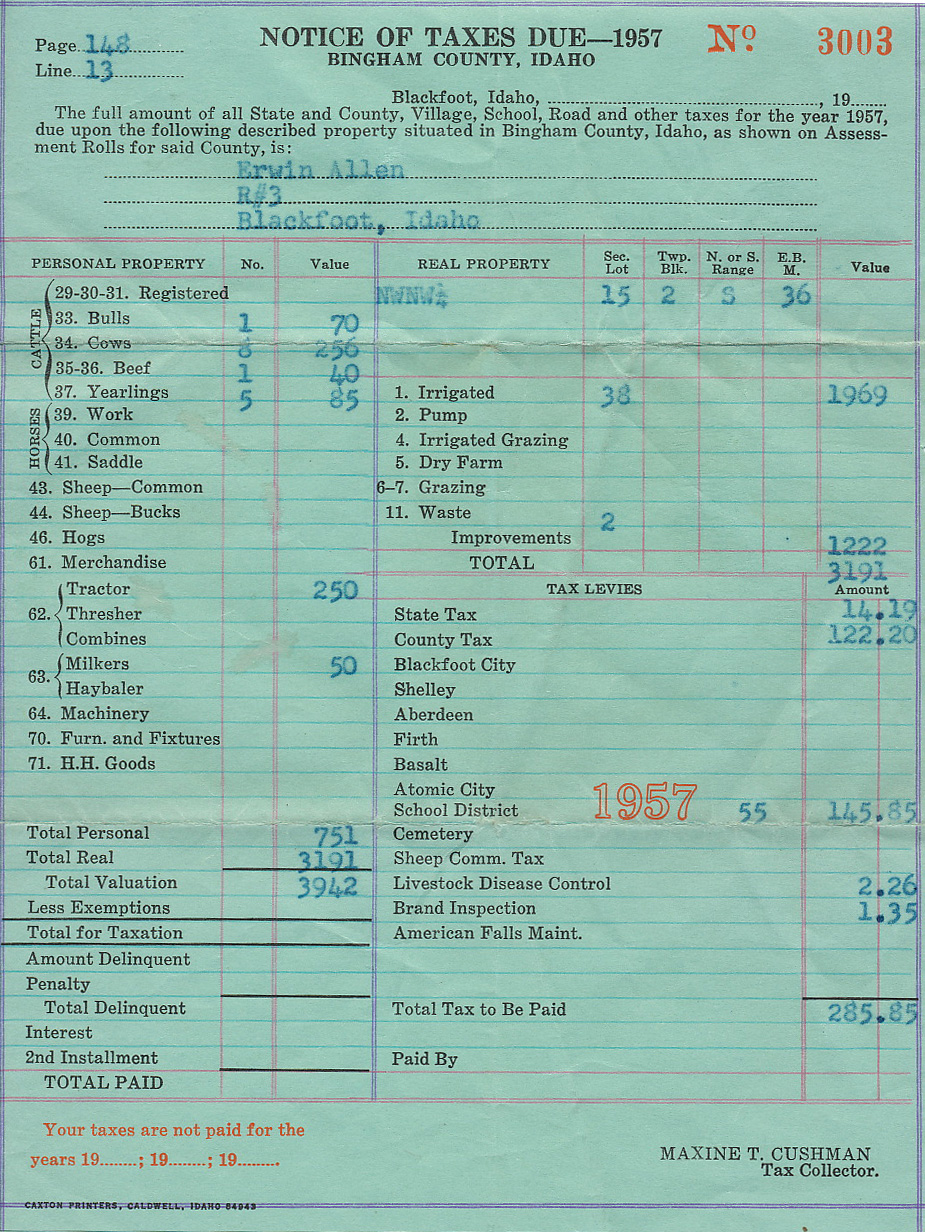
Tax bill for Allen farm 1957
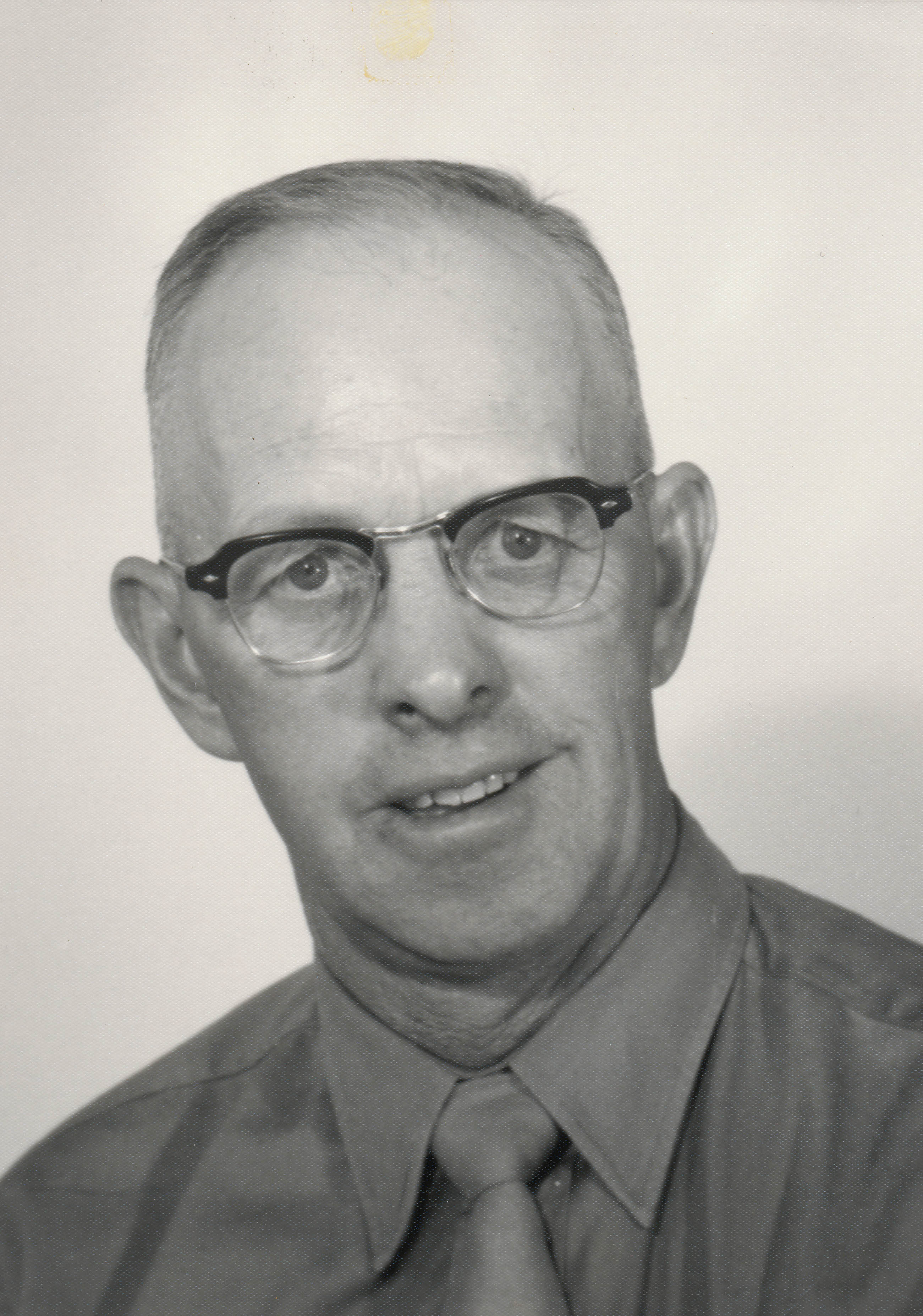
Erwin about 1960
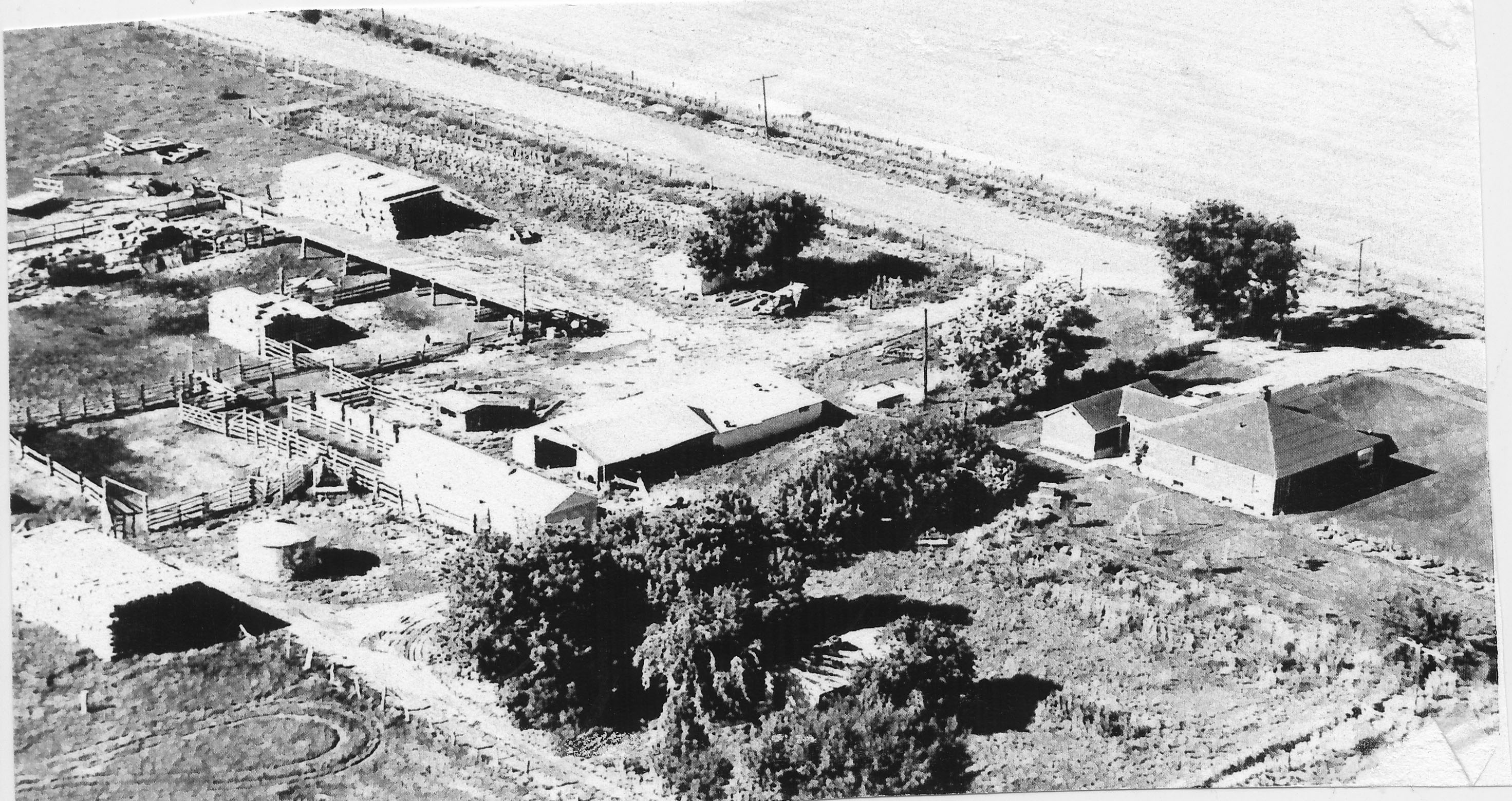
The Allen Farm about 1962
In the 1960's and 70's Erwin would often go fishing with his family or with his friends. Wolverine, Summit Creek, Island Park, Ririe Reservoir, Palisades Reservoir and the Blackfoot river and reservoir are among the places they would go. Here are some entries from Erwin and Isolene's journal in 1977 for fishing. Most of the entries are made by Erwin
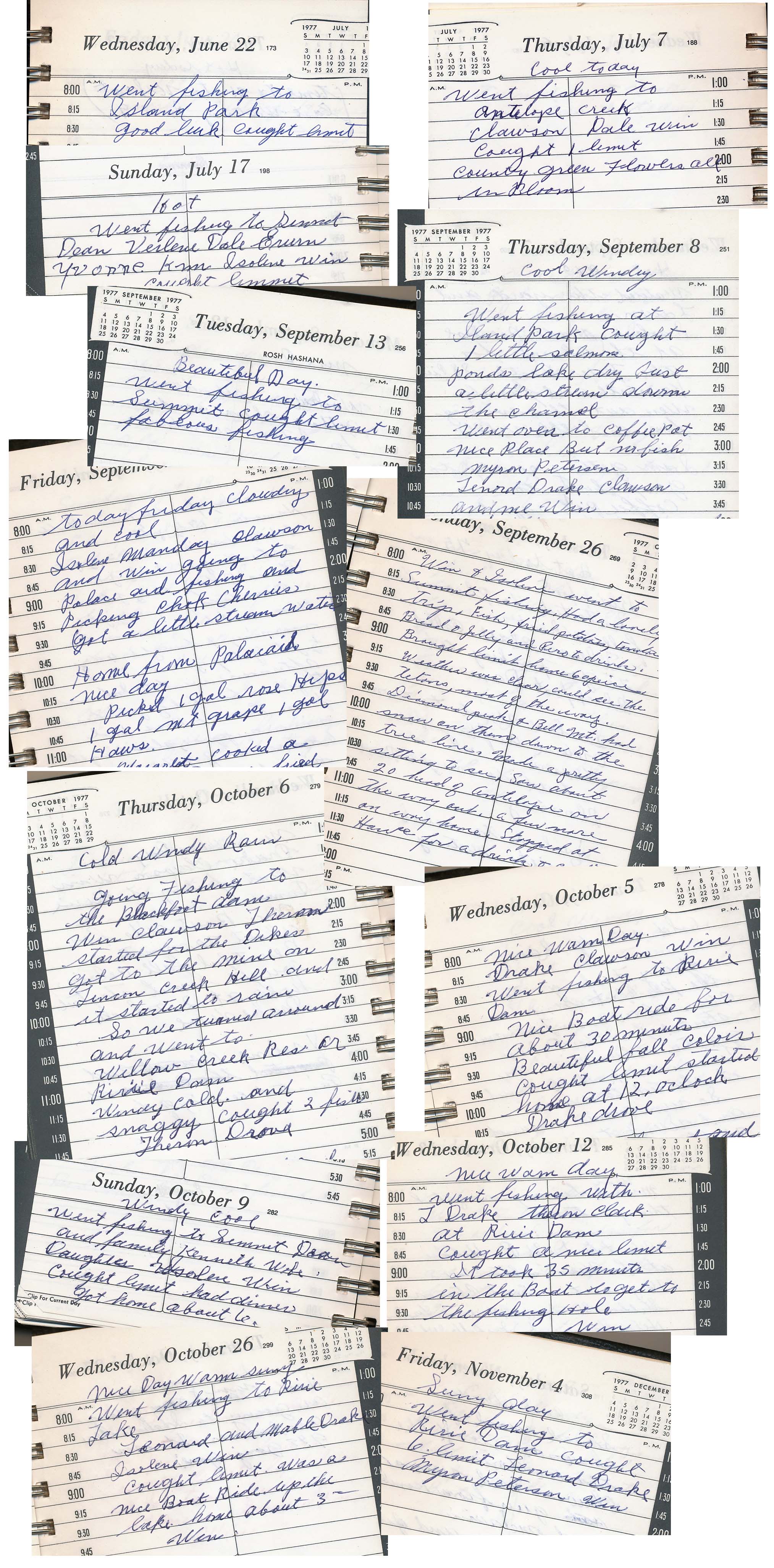
Erwin fishing trips in 1977
Here are several audio files about various fishing trips to Wolverine, Summit Creek other places. Fishing with Frank Berlin (Dean and Verlene). Fishing Spring and Summit Creek(Dean, Verlene and Erwin (son)). I remember catching my first fish on a fishing trip with Grandpa and Grandma Allen out at Summit Creek when I was about 5 or 6 years old.
Memories from Michael Baird (grandson) as a little boy (age 4-8, 1961-1965)
When I was a little boy, in particular when I was age 5-6 when we lived just a few miles away, I spent a lot of time on the farm. At that time besides working the dairy farm grandpa worked for the school district. One of my favorite things to do was to go with him as he delivered food to the different schools. We would have to go out to Fort Hall and would always stop on the way out of Blackfoot where grandpa would buy me a bottle of strawberry soda pop. I can still picture standing with him next to the old style coolers where you would open the top and select a bottle of soda. We would also stop at the Wapello school where Grandma was a cook and get fresh rolls, cinnamon rolls etc.
I "helped" grandpa with many things around the farm. I would wear Grandma's rubber irrigating boots to go help him turn the irrigation water out in the fields and on the lawn. I would ride on the tractor with him out in the fields or around the farm yard. We would feed the calves and chickens and of course milk the cows.
Grandpa had quite the sense of humor. He would bring the bull into the stalls with the cows and tell us grandchildren that the bull gave the cream. There was an old spud cellar on the farm when I was little. In the door was a knot hole. Grandpa put a picture of a little girl behind the hole and then would tell us that was a picture of him when he was a little girl. I remember him putting a delicious looking plastic apple up in the apple tree to fool anyone into thinking it was the first ripe apple in the tree.
I would spend hours playing on the tractor pretending I was farming. Mom told me that when I was real little grandpa would bring the tractor into the front yard of the house so I could play on it where Mom could keep an eye on me. Another memory I have is helping with loading straw and hay. None of the acreage on his farm that I remember was for hay or straw. Seemed to me it was all pasture. So he would mow, rake, bail and haul hay from other farmer's fields. He had an old hay wagon that was pulled by the tractor. My job was to help my uncle Kenneth line up the bales of straw for the loader onto the wagon while Grandpa would stack the straw/hay on the wagon. A cool drink of water could be had from a clorox jug wrapped in gunny sacks soaked in water hanging from the tractor. After loading Grandpa would tie the load down with rope and pulleys. We would then ride on top of the load back to the farm. I was always nervous about the load tipping over when we went around corners and Kenneth would always laugh at me because of my fears.
Grandpa and Grandma would take us fishing out to summit creek. I caught my first fish there. There was a spring we would always stop at on the way back to get a drink.
I liked to build little boats to float in the irrigation ditch and when the lawn was irrigated. In grandpa's shop he had an electric grinder. I would find wood laying around the farm yard and then take it into the shop and use the grinder to shape the wood. I didn't use any saws just the grinder. I remember Grandpa getting a bit mad at me because I "clogged" up the grinder with wood from grinding it so much and hard. I would then sometimes paint them with paint he had laying around. I still have one of the boats that I made there when I was a bit older - maybe 10 years old.
Memories from Daniel Baird (grandson)
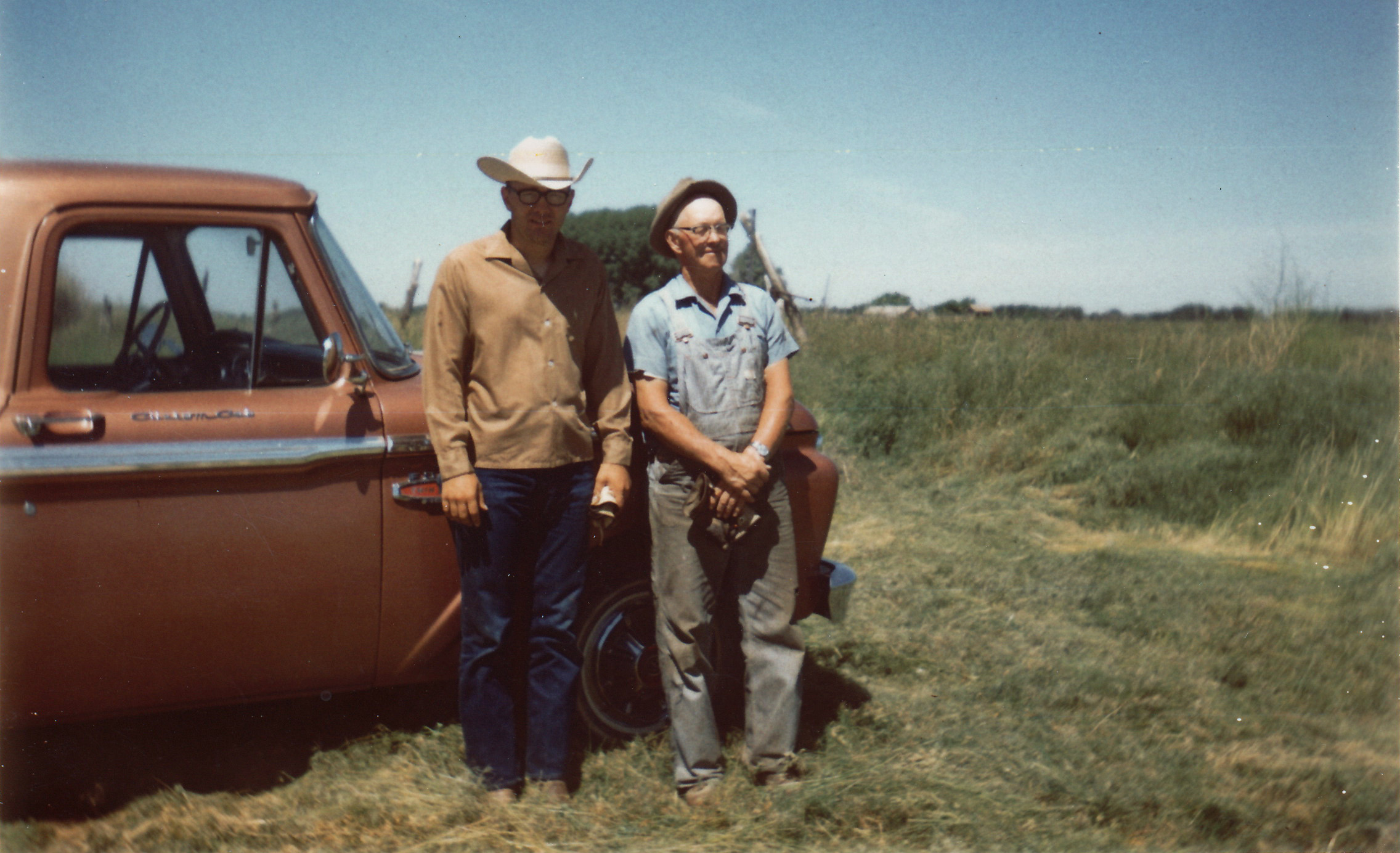
Erwin and Kenneth Haying at the Clark's June 1970.
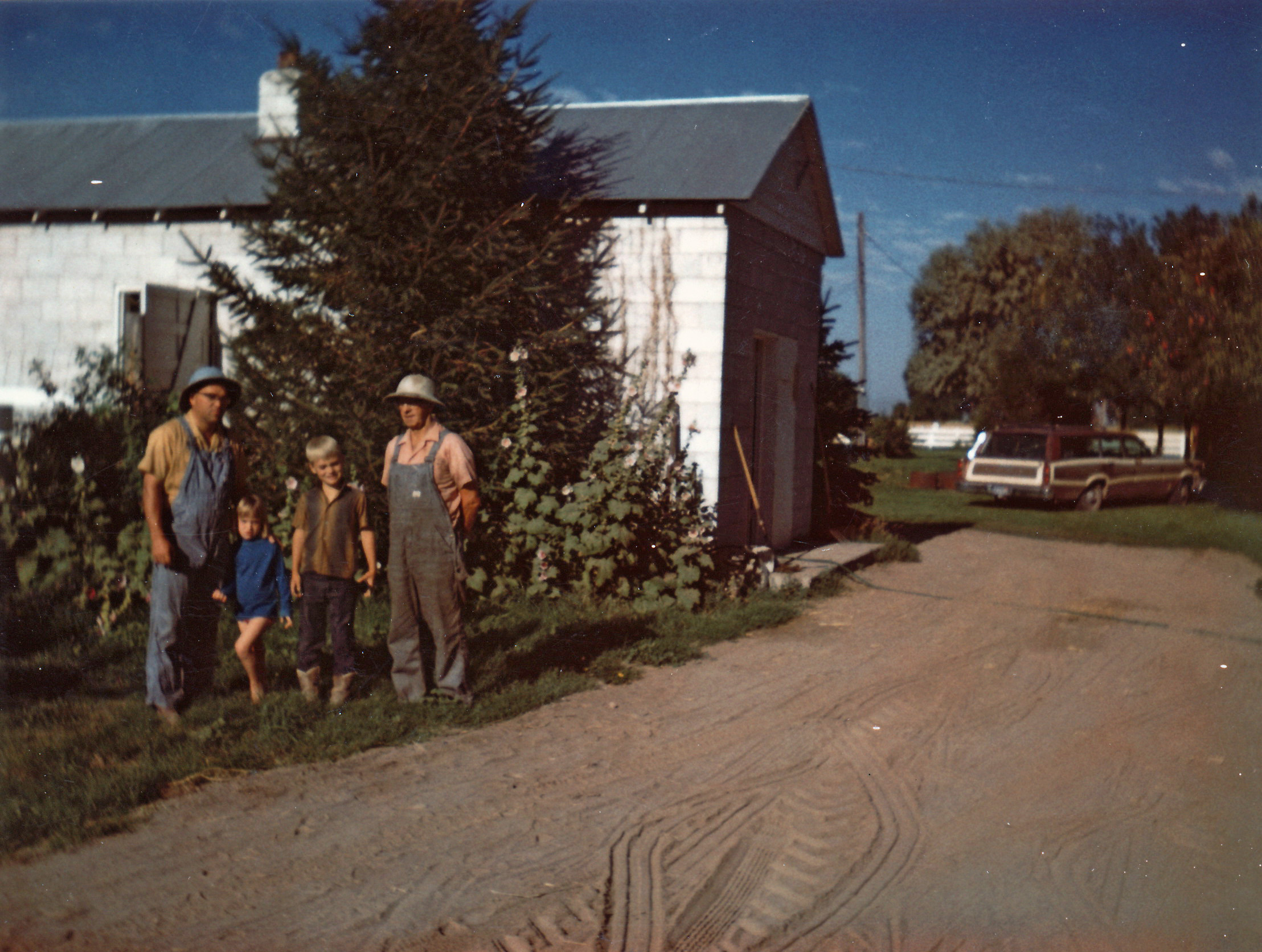
Erwin (on Right) with son Dean and grandchildren Dale and Laura
In front of the Milk Barn.
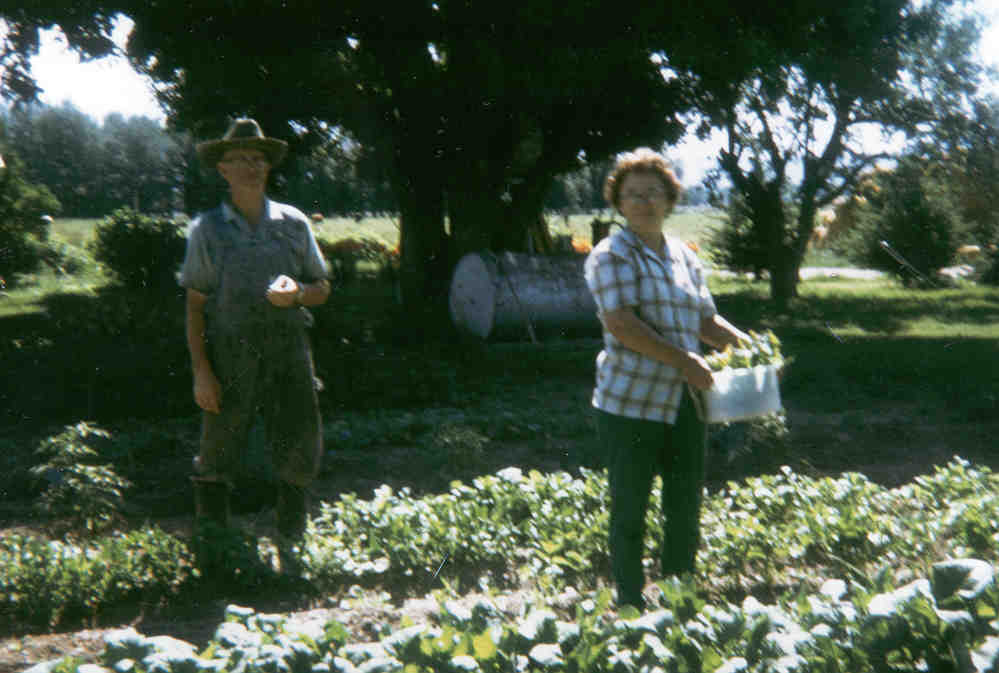
Erwin and Isolene in garden behind their house. Erwin, age ~late 60's-early 70's.
A jelly that is "famous" amongst Isolene's and Erwin's descendants is grasshopper jelly. Apple jelly with green food coloring. Because it was the same color as grasshoppers, Erwin called it grasshopper jelly...
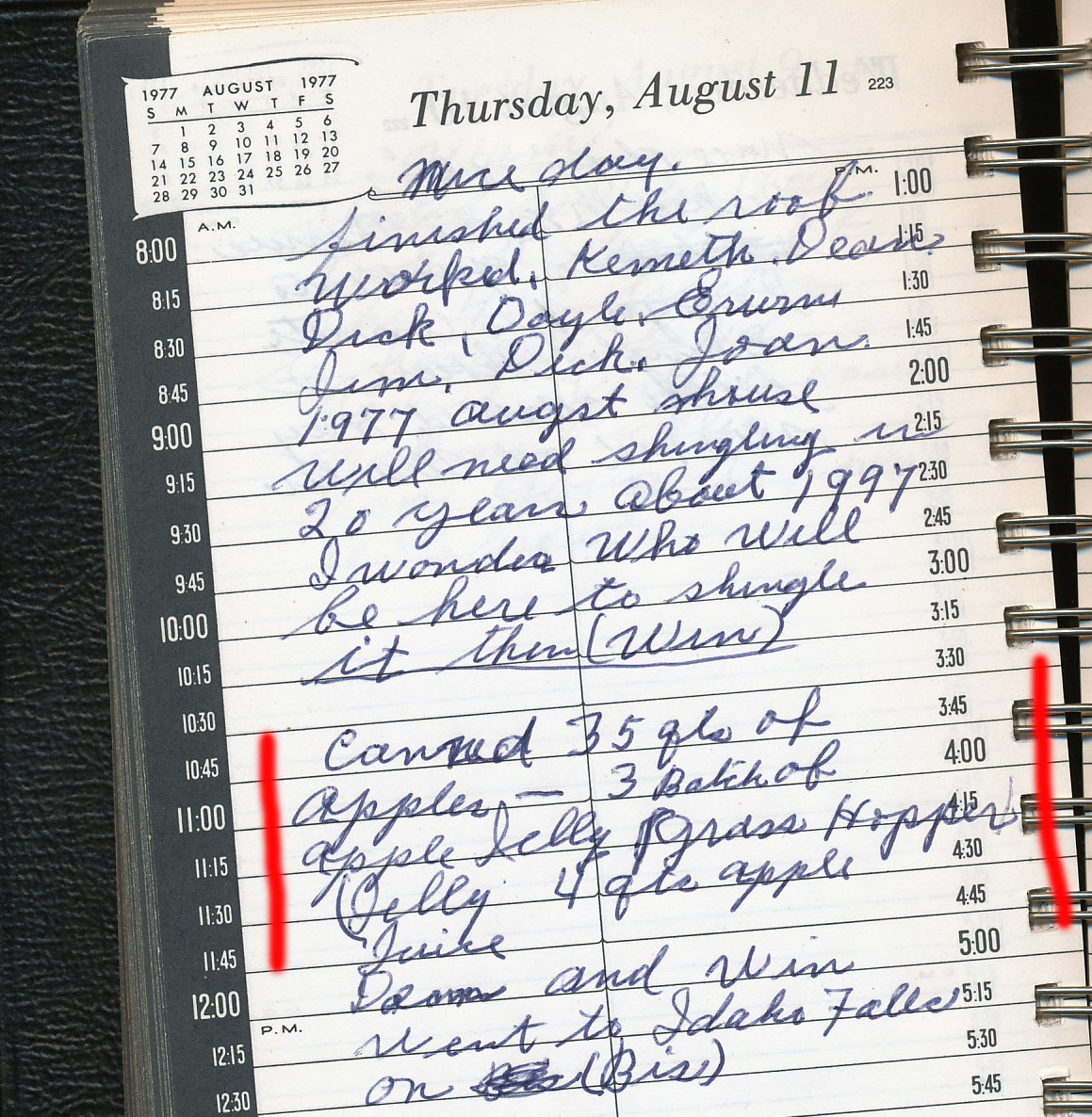
Grasshopper Jelly - August 11, 1977
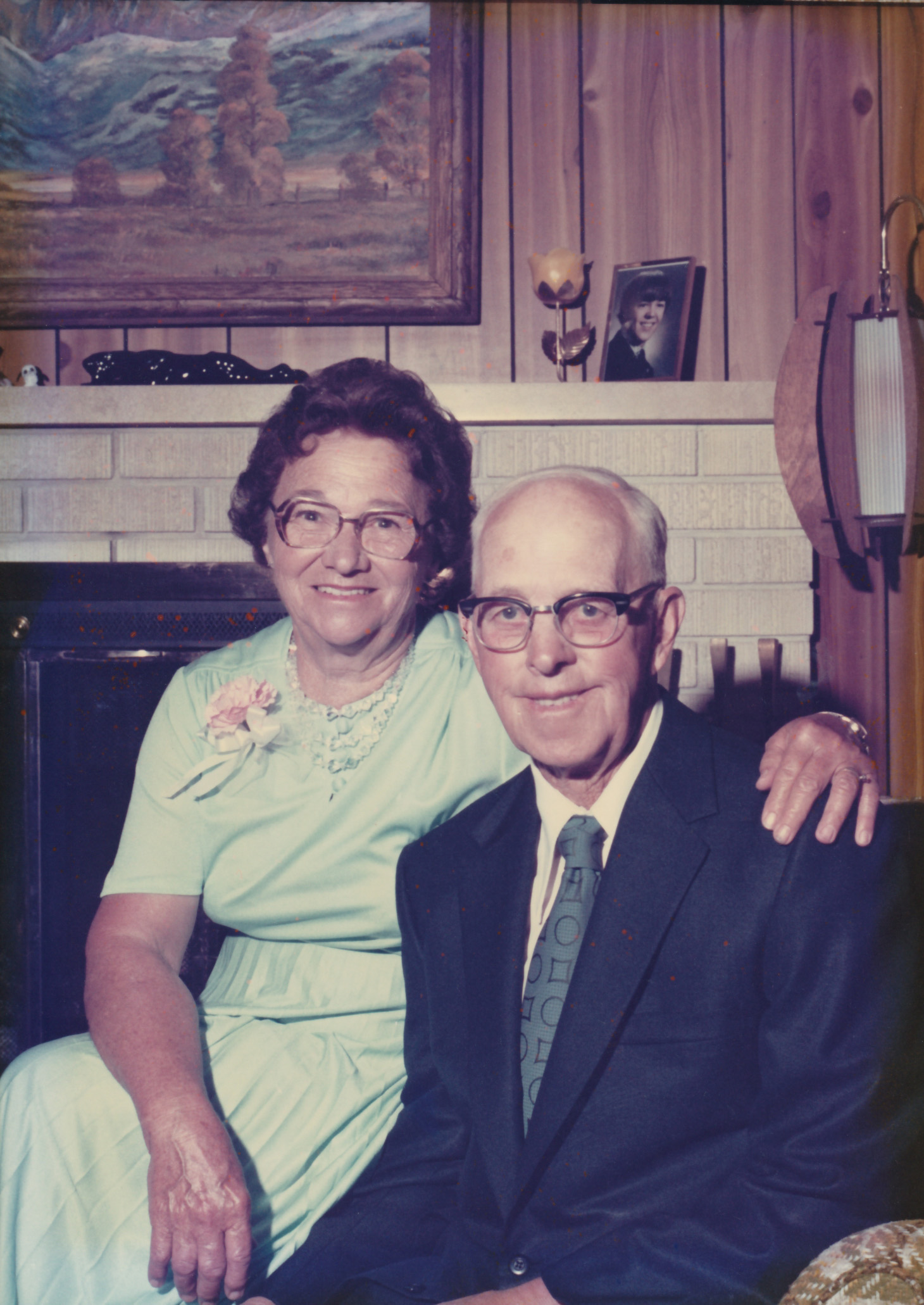
Isolene and Erwin (age 75)
August 1980
Erwin was ordained a High Priest 20 May 1979 by John Waldo Olsen.
On August 9, 1980, Erwin and Isolene were honored for a 50th Wedding anniversary at their home.
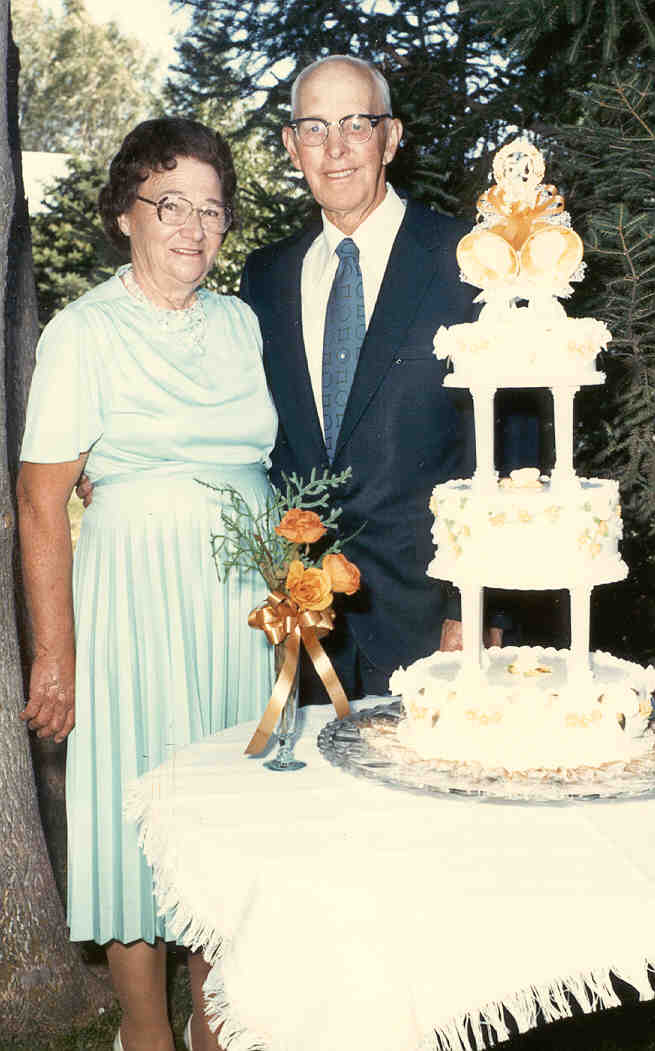
Erwin (age 75) and Isolene
August 9, 1980 at 50th Anniversary Celebration
At the last of his life Erwin suffered from prostate cancer. He died 23 November, 1980 at the farm in Wapello. The Funeral was held a the Wapello chapel on 26 November, 1980. He was buried in the Grove City Cemetery, Blackfoot, Idaho that same day. Link to obituary in newspaper.
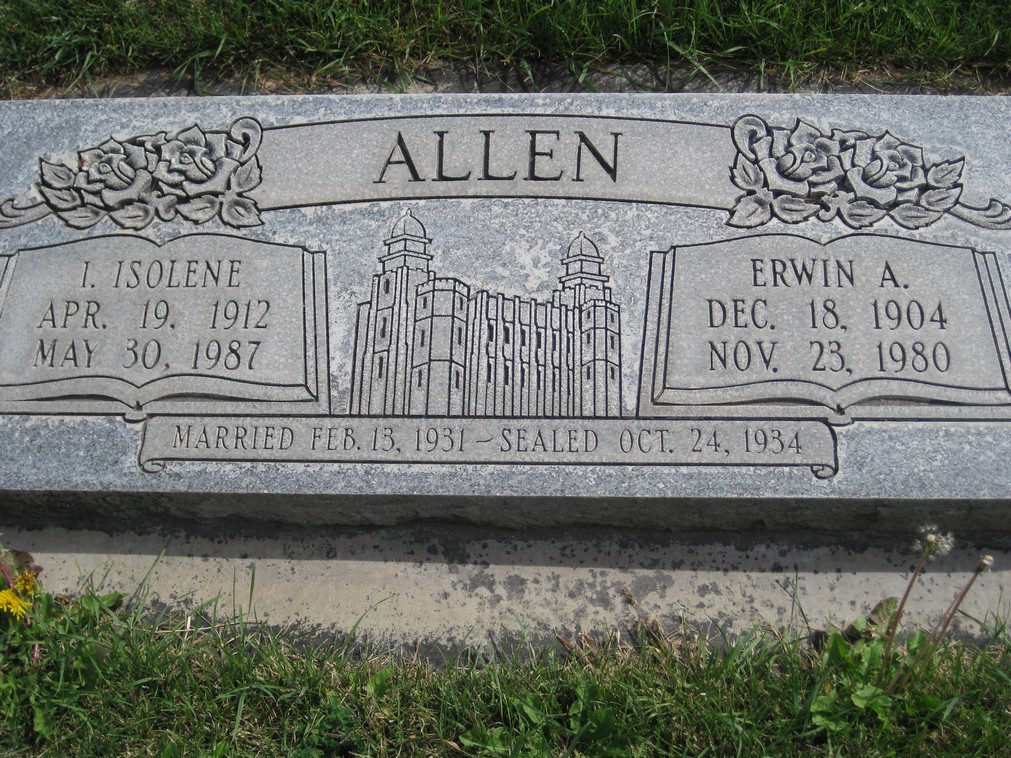
Erwin Allen's Gravestone
Photographs